This site uses session cookies and persistent cookies to improve the content and structure of the site.
By clicking “ Accept All Cookies ”, you agree to the storing of cookies on this device to enhance site navigation and content, analyse site usage, and assist in our marketing efforts.
By clicking ' See cookie policy ' you can review and change your cookie preferences and enable the ones you agree to.
By dismissing this banner , you are rejecting all cookies and therefore we will not store any cookies on this device.
A wide range of bodies fund health and social care research. It is vital to the success of your project that it is costed accurately. Your local research and development office can suggest suitable sources of funding, and advise you on costing your project. It is important to understand the distinctions between research costs, support costs and treatment costs and how they are provided.
Applicants must secure any project funding required from bodies outside the NHS before submitting the applications to review bodies for approvals. Otherwise, if funding has not been secured, and the funding body later requires changes to be made to the proposal, these would require further review by the review bodies.
As outlined above, funding for research can come a variety of sources, including:
- commercial funders, including industry and private companies
- non-commercial funders such as government departments, research councils, charities, National Institute of Health in USA (NIH) and the European Commission.
It is important that the various types of costs of research are appropriately attributed in order to ensure that the appropriate funding arrangements are put in place. For funding queries related to a specific area of the country, please see the links below:
- Northern Ireland
Below are links to some possible sources of further information (note this is not an exhaustive list):
- Association of Medical Research Charities (AMRC) is the national membership organisation for medical and health research charities. AMRC members support over one-third of all UK publicly-funded medical research in the UK, with members investing over £1.2 billion in health research in the UK in 2012.
- Chief Scientist Office (CSO) offers a number of different funding streams to directly support health research in Scotland.
- Medical Research Council (MRC) funds research through a range of grants, calls, highlight notices, studentships and fellowships.
- National Institute for Health Research (NIHR) funds a range of programmes addressing a broad range of health priorities. Funding is based on the quality and relevance of the research to personal social services, public health and the NHS.
- NIHR Evaluation, Trials and Studies Coordinating Centre (NETSCC) is part of the NIHR, manages a number of research programmes, including: Efficacy and Mechanism Evaluation; Health Services and Delivery Research; Health Technology Assessment; Public Health Research; and Systematic Reviews.
- Health and Care Research Wales is the Welsh Government body whose goal is to fund research that will inform care and improve the health and wealth of the people of Wales.
- Public Health Agency – Health & Social Care Research and Development Directorate (HSC R&D) provides information about funding opportunities that are available to researchers working in Health & Social Care (HSC) Northern Ireland.
- UK Clinical Research Collaboration (UKCRC) many different organisations fund health research in the UK. The UKCRC has developed a coherent approach to health research funding by providing a forum to coordinate the activities of funding bodies and by developing an evidence base to inform strategic planning.
- UK Research Office (UKRO) is the European office of the UK Research Councils. Activities include providing details on European Commission funding opportunities.
- Privacy notice
- Terms & conditions
- Accessibility statement
- Feedback or concerns


Largest analysis of UK health research funding published
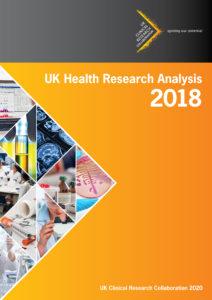
A report published on 28 January 2020 delivers the most comprehensive analysis of UK health research funding ever compiled. Bringing together data from 146 charity, professional and public sector organisations, the UK Health Research Analysis 2018 found that in 2018 these funders contributed £4.8 billion to support research to improve human health.
The report was compiled by a collaboration of 12 public and charitable funders led by the Medical Research Council, on behalf of the UK Clinical Research Collaboration (UKCRC). The UKCRC partnership supports coordination and collaboration between the major stakeholders that influence clinical research in the UK, and these efforts are underpinned by an analysis of UK health research funding every four to five years.
This latest report is the fourth in a series that charts changes in health research over the last 14 years. From 2004 to 2009, the reports found that public and charitable support for health research grew, with a compound annual growth rate (CAGR) of 8.5%, then over the last ten years funding for health research remained, in real terms, almost level with a CAGR of 1.5% (2009 to 2018).
The report notes that main areas to receive the highest increases in proportion of investment were research activities important for translation - research that aids translating scientific discoveries into new treatments and healthcare benefits. Early detection of disease and the development and evaluation of new treatments were the main areas that received increased funding, totalling £523 million over 14 years.
Half of public and charity support for health research was directed at basic science, which underpins further study or seeks to identify the causes and progression of disease. It is this discovery science that will provide a pipeline of new potentially transformative ideas, technologies and methods for the future.
Funders have continued to increase funding for other areas, such as prevention-related research (e.g. vaccine development and smoking/dietary interventions), that were identified as having lower investment in previous UK health research analyses.
The report highlights that public and charity funders support research into a diverse range of disease areas, with the largest increase in support for research into infectious diseases. While disease burden in the UK in this area is low, this research includes efforts to combat the global health risk of pandemics and antimicrobial resistance.
Cancer research continued to attract a substantial proportion of total funding, with high levels of charity support. Cancer is the disease that leads to the highest UK disease burden, according to the World Health Organisation.
The report includes data from 82 new funders – bringing the total of 146 funders to more than double the number included in the 2014 report – and included coding of over 22,500 projects.
It is the first report in the series to undertake a detailed analysis of international funding support for UK research teams (totalling £240 million income to the UK in 2018) and the first to record UK funder contributions to research overseas (totalling £220 million funding to 66 countries in 2018).
In addition to the £4.8 billion of public and charity 2018 funding detailed in this report, the authors have provided estimates for the total expenditure on health research in the UK. Estimates for expenditure in the pharmaceutical sector (£4.3 billion in 2017, continuing the recent recovery following the economic crisis of 2008), brought the estimated total for UK health research to £8.67 billion.
To download the report see the HRCS Online website .
We use cookies on our website to support technical features that enhance your user experience.
We also use analytics & advertising services. To opt-out click for more information.
- COVID-19 Epidemiological Bulletin
- Germ Defence
- Resources for Councils and community responses to COVID-19
- Information for schools, colleges, universities and parents
- COVID-19 Vaccination Programme questions and answers
- Where to get vaccinated
- COVID-19 Vaccination Programme information materials
- Infection Prevention Control Guidance for Adult COVID-19 vaccination clinics
- Updated LFD Testing guidance, effective from 29 February 2024
- Contact Tracing Service - Management Information Update
- Privacy information
- Testing in care homes and hospices
- Guidance for Primary Care
- Guidance on PPE
- Questions and answers for visiting care homes
- Questions and answers for HSC staff
- Guidance for healthcare professionals, carers and care homes
- Staff health and wellbeing resources
- PHA structure
- Schedule of board meetings
- Board agenda
- Board minutes
- Board papers
- Governance and Audit Committee agenda
- Governance and Audit Committee minutes
- Board documents
- Compliments and complaints
- Who we are and what we do
- What and how we spend
- What are our priorities and how we are doing
- How we make decisions
- Policies and procedures
- Lists and registers
- Services we offer
- Making Life Better Regional Network
- Making Life Better Conference 2019
- Making Life Better Conference 2020
- MLB Seminars
- Consultation: Equality and Disability Action Plans 2023-28
- Joint Consultation Events – Equality and Disability Action Plans 2023-28
- Public Health Agency Stakeholder Engagement – Alcohol and Drug Services
- Public consultation on services for individuals who have been bereaved by suicide.
- Substance Use Strategic Commissioning and Implementation Plan Consultation
- Draft Training Framework
- Building Community Capacity to Address Health Inequalities Across Northern Ireland
- Modernising the Diabetic Eye Screening Programme
- Modernising the diabetic eye screening programme
- PHA Draft Corporate Plan 2017–21
- Public consultation on services for those bereaved by suicide
- Consultation on the future of the Lifeline Crisis Intervention Service - NOW CLOSED
- Consultation on support model for those bereaved by suicide
- Consultation on Infant Mental Health Framework and Plan 2015-2018
- Alcohol and Drug Commissioning Framework for Northern Ireland 2013-16
- Disability Action Plan and Equality Action Plan
- Cope with Confidence - survey of heart failure patient experience
- PHA Corporate strategy
- Personal and Public Involvement strategy
- Consultation for PPI Proposed Action Plan 2016-19
- Consultation on Community Capacity Building under Mental & Emotional Wellbeing and Suicide Prevention
- Consultation on the Lifeline Crisis Response Service
- Speak out for change
- Consultation on Volunteering in Health and Social Care
- Community Development strategy
- Publications
- Scarlet Fever and IGAS
- Courses and conferences
- Blood-borne viruses/ STIs
- Shiga toxin-producing E.coli (STEC)
- Priority areas
- Local incidents
- Gastrointestinal infections
- HCAI and AMR Indicator Dashboard
- Reference documents
- Health protection improvement and inequalities
- Travel advice
- Immunisation/vaccine preventable diseases
- Social media resources for vaccination programmes
- Preschool vaccination programmes
- World Immunisation Week
- Meningitis - know the symptoms
- Mycobacterium chimaera GP Guidance
- Avian influenza
- Tuberculosis (TB)
- Whooping cough
- Legionellosis
- COVID-19 vaccine social media resources
- Support networks
- Keeping warm during adverse weather
- Carbon monoxide poisoning
- Advice if flooding occurs
- Using emergency water supplies
- Water restoration advice
- Looking after vulnerable and elderly neighbours
- Health risk to humans of blue green algae
- Antimicrobial use and resistance
- Healthcare Associated Infections
- Group B Streptococcus
- Brucellosis (human)
- Annual surveillance reports - seasonal influenza
- Influenza Weekly Surveillance Bulletin
- Respiratory Syncytial Virus (RSV)
- Tuberculosis
- Legionnaires’ disease
- Sexually transmitted infections
- Meningococcal disease
- Vaccination coverage
- Whole genome sequencing
- NOIDs archive
- Vaping addiction can soon take hold
- Living Well: Take 5 steps to wellbeing campaign
- Organ donation: Law change
- Family Nurse Partnership
- Roots of Empathy
- The design and planning of outcome focused children’s services.
- Fuel poverty
- Neighbourhood renewal
- Tackling childhood obesity
- Improving wellbeing through peace of mind
- Stopping smoking
- Highlighting the dangers of emerging drugs
- Averting an alcohol crisis
- One Stop Shops
- Skin cancer prevention
- Conferences/Workshops
- Protect Life Implementation Groups
- Abdominal aortic aneurysm (AAA) screening
- Antenatal screening
- Breast screening - frequently asked questions
- About bowel cancer
- Why screen for bowel cancer?
- How do I do the screening test?
- Frequently asked questions
- Cervical cancer screening
- Information for people with diabetes, their families and carers
- Information for health professionals
- Newborn screening
- Farm Families Health Checks Programme
- Eye health and safety
- Group B Streptococcus and pregnancy
- Stillbirth Conference – Causes, Prevention and Management
- Commissioning teams
- Northern Ireland Cerebral Palsy Register
- Northern Ireland Cancer Registry
- Ok to ask campaign
- Useful links
- Medical workforce planning
- Medical training with the Northern Ireland Medical and Dental Training Agency (NIMDTA)
- Public health training
- Revalidation
- Public Health Annual Research and Practice Conference, 8 June 2016
- Public Health Annual Scientific Conference 2015
- Service development and improvement
- Text-a-Nurse
- Safer sleeping
- Text-A-Nurse - parents, carers and school staff
- Children's nursing (CCN) service
- Primary care nursing
- Community care nursing
- Delivering Care
- Nurse prescribing
- Mental health and learning disability services
- Palliative Care Week 6-11 October
- Preconception Care
- Screening tests for you and your baby
- Continuity of Midwifery Carer
- Online Antenatal and Postnatal education classes
- Following the birth of your baby
- Perinatal Mental Health
- Patient and client experience
- Dysphagia - public information
- Dysphagia - healthcare professionals
- Remote telemonitoring
- Other useful guidance
- Falls prevention
- Quality 2020
- Personal and Public Involvement (PPI)
- Corporate plan 2017-2021
- Corporate strategy 2011-2015
- Business plan
- Performance management
- Process for awarding funding
- Process for authorising payments
- Talking really helps suicide prevention campaign resources
- Winter vaccines: Boost your COVID-19 and flu protection
- Smoking in private vehicles and nicotine inhaling products regulations: resources for campaigns
- Choose to live better: Making healthier choices campaign
- Public information campaigns
- Design and electronic communications
- COVID-19 vaccine resources
- Media reporting on suicide
- Health Matters Issue 1
- Health Matters Issue 2
- Determining what works
- Getting information where it is needed
- Specific research projects and campaign support
- Health and Social Care Quality Improvement
- Changes in PHA advertising of Funding Opportunities
- Contracts Awarded
- Advance Care Planning Seeds Grants Up to £2000 available
- PHA Procurement Priorities
- COP Climate Change
- Coronavirus (COVID-19)
- Cancer Research
- Diseases & Conditions
- Mental Health
- Women’s Health
- Circular Economy
- Sustainable Development
- Agriculture
- Research & Innovation
- Digital Transformation
- Publications
- Academic Articles
- Health & Social Care
- Environment
- HR & Training
- Health Research
- North America Analysis
- Asia Analysis
- Our Audience
- Marketing Information Pack
- Prestige Contributors
- Testimonials

- North America
- Open Access News
- Research & Innovation News
UK health research funding plateaus

UK health research funding reached £5 billion in 2022 but is now plateauing, according to the UK Health Research Analysis 2022 , but why?
The report, commissioned by the UK Clinical Research Collaboration (UKCRC), provides the most detailed overview yet of UK health research funding from 2004 to 2022 from all public sectors.
During this 18-year period, annual funding had increased overall reaching £5 billion in 2022; however, since 2018, this growth has slowed to just 0.2% annually, resulting in a real terms decrease of £110 million. The decrease has been attributed to high inflation and a reduction in the charity sector’s contribution to health research due to the impact of COVID-19.
23,500 projects supported by 173 funding organisations
The Health Research Classification System was applied to over 23,500 projects supported by 173 funding organisations, corresponding to just over £5 billion of spend within the UK in 2022.
The analysis showed that of the £5 billion spent: £2.8 billion was invested directly on research projects; £1.4 billion was spent on infrastructure and other indirect support; and £865 million of health-relevant support funding was added from other sources not directly captured in the analysis.
The report also noted that funding for research projects over the study period was stable for most areas of health but with some notable trends:
- Translational research, in detection and diagnosis, treatment development, and treatment evaluation, spends were up 13.0% from 22% to 35% between 2004 and 2022, resulting in a real-term increase of £676 million
- Prevention research expenditure was up 4.6% from 2.5% in 2004 to 7.1% in 2022, conveying a real-term increase of £163 million since 2004
- Research on discovery science remains strong, accounting for almost half of all funding, but growth in spending has been prioritised to other research activities
- The largest growth has been in infections research (up 6.4%, from 9.0% in 2004 to 15.4% in 2022) as funders sought to address the challenges of antimicrobial resistance, COVID-19 and post-pandemic recovery
- Almost a fifth of health funding was spent on cancer research, but this has declined in proportion to overall funding (from 20.3% in 2004 to 16.8% in 2022, down by 2.1% since 2018)
£5 billion annual investment
Professor Lucy Chappell, Chair of UKCRC, and Chief Scientific Adviser, Department of Health and Social Care, said:
“The UK health funding ecosystem successfully brings together government spending with the charity and private sector to drive world-leading discovery research and innovation that is having impact for patients and the public, the NHS, and for the UK life sciences industry.
“This report shows how the £5 billion annual investment made by public and charitable funders is being spent, including substantial growth in patient-focussed research.
“We have seen this ecosystem discover and deliver new technologies for early detection and diagnosis alongside new treatments and vaccines for prevention.
“This was only possible through sustained investment over many decades in discovery science and our translational infrastructure.
“The health funders across the public, charity and private sectors will continue to work together closely to address the current and future health challenges.
UK health research is world-class
“UK health research is world-class; we should continue to see increasing research and development funding in order to drive health and economic impact.”
Editor's Recommended Articles

RELATED ARTICLES MORE FROM AUTHOR

The secrets of the brightest gamma-ray burst: The B.O.A.T supernova mysteries

The moons transformation: How it turned itself inside out

Insights into autism development, treatment and management

DESI telescope unveils cosmic secrets: Mapping the universe’s evolution

BREAD experiment takes on dark matter

Curtin University discover rare dust particles in ancient extraterrestrial meteorites
Leave a reply cancel reply.
Save my name, email, and website in this browser for the next time I comment.
Related Academic Articles

Train derailment in East Palestine, Ohio: The toxic risks of transporting...

Thermodynamics of hadronization: The rotating lepton model explains key CERN experiments

The future of sustainable electrified catalyst recycling
Follow open access government, latest research reports.

Karl von Frisch and Konrad Lorenz: Two biologists in Nazi Germany

Science speaks out! INTERACT bridge the gap between researchers and the...

Biocolloidy and Epigenetics – Is “scientific revolution” a useful concept in...

The role of synthetic biology in Microbial electrosynthesis
Latest research ebooks.

Positron-electron catalysis of chemical and nuclear synthesis

Unique Low-Cost Ultrananocrystalline Diamond Coating

Assessing the role of religion in restorative justice approaches to crime

Reducing non-human primate sacrifice for brain research in the virtual era
Feature articles.

The natural refrigerant choice and environmental considerations

Vigilant’s Secure Data Sharing Platform has been described as, “arguably the...

Damp and mould-related surveys: What is a healthy building?

Heat pumps as a renewable energy source to stabilise the electricity...
Latest publication.

Open Access Government April 2024
Latest ebook.

Are over-the-counter drugs an under-appreciated toxic danger?
- Terms & Conditions
- Privacy Policy
- GDPR Privacy Policy
- Marketing Info Pack
- Fee Schedule

Image credit: Juan Gaertner/ Shutterstock
Oxford awarded £9m for the next generation of cancer experts
Cancer Research UK (CRUK) has awarded £9m to the University of Oxford, to support the next generation of doctors and scientists to bring novel cancer treatments to patients.
CRUK is to award the funding over the next five years to train early-career clinician scientists - doctors who also carry out medical research - as part of its Clinical Academic Training Programme.
The Clinical Academic Training Programme will invest £58.7m at nine research centres, including the Cancer Research UK Oxford Centre .
Clinician scientists play an essential role in translating cancer research, helping to bridge the gap between scientific research carried out in laboratories and clinical research involving patients.
Working across both research settings, their contributions to new knowledge and its translation to clinical practice are critical for cancer research.
Professor Mark Middleton , academic lead for the clinical academic training programme in Oxford, said: 'We are delighted to gain further Cancer Research UK funding to help train tomorrow’s leading cancer researchers. We make the greatest progress when clinicians and scientists work together, and clinician scientists are the key to this approach. Cancer Research UK’s funding means not only that our doctors and medical students can train as scientists, but also that our scientists will understand better how to apply their work to the benefit of patients. This will accelerate progress towards our goal of beating cancer together.'
Becoming a clinician scientist usually involves doctors taking time out of their medical training to undertake a PhD, before returning to train in their chosen specialisation, but many clinicians don’t come back to research after qualifying as consultants. This may be due to existing pressure on the healthcare system and lack of available funding.
To tackle this issue, Cancer Research UK’s Clinical Academic Training Programme provides flexible training options alongside mentorship and networking opportunities to better support clinicians who want to get involved and stay in cancer research.
Michelle Mitchell, Cancer Research UK’s Chief Executive, said: 'Clinician scientists have a very important role to play by bringing their knowledge and experience of treating people with cancer to scientific research. We need all our doctors and scientists to be able to reach their full potential, no matter their background. That’s why we are continuing to provide flexible training options for early-career clinician scientists. After the success of the first five years of this programme, we want to encourage even more clinicians to get involved in cancer research to help us get closer to a world where everybody lives longer, better lives free from the fear of cancer.'
DISCOVER MORE
- Support Oxford's research
- Partner with Oxford on research
- Study at Oxford
- Research jobs at Oxford
You can view all news or browse by category
Internet Explorer is no longer supported by Microsoft. To browse the NIHR site please use a modern, secure browser like Google Chrome, Mozilla Firefox, or Microsoft Edge.

Our place in the UK research landscape

We have a central role in England's health and care research landscape. We work alongside other organisations that have an overarching aim to strengthen health research in the UK
Research funding in the UK nations
Each UK nation has its own government department that oversees health and care research:
- The Department of Health and Social Care funds health and care research in England through the NIHR. It also supports applied health research for the direct and primary benefit of people in low- and middle-income countries, using UK government international development funding.
- Health and Care Research Wales is a national, multi-faceted, virtual organisation funded and overseen by the Welsh Government’s Research and Development Division. It provides an infrastructure to support and increase capacity in research and development (R&D), runs a range of responsive funding schemes and manages the NHS R&D funding allocation for Wales.
- The Chief Scientist Office (CSO) , part of the Scottish Government's Health and Social Care Directorate, supports and promotes high quality research aimed at improving the quality and cost effectiveness of services offered by NHS Scotland and securing lasting improvements to the health of the people of Scotland.
- The Health and Social Care Public Health Agency (HSC PHA) is the major regional organisation for health protection in Northern Ireland. The agency has a mandate to protect public health, improve public health and social wellbeing, and reduce inequalities in health and social wellbeing.
Research in England
The NHS is committed, through the NHS Constitution , to the promotion, conduct and use of research to improve the current and future health and care of the population.
The Department of Health and Social Care's Arm's Length Bodies (ALBs) include a range of organisations, such as NHS England, Public Health England, Higher Education England and regulatory bodies. ALBs each have specific responsibilities that relate to health, public health and social care research.
The Government's Office for Life Sciences champions research, innovation and the use of technology to transform health and care service. It published the government’s Strategy for UK Life Sciences in 2011, with the ambition that the UK will become the global hub for life sciences research in the future and a key contributor to sustained economic growth. The strategy references the broad underpinning role the NIHR has in delivering this ambition.
Each year the Research Councils, funded by the Department for Business, Energy and Industrial Strategy (BEIS), invest around £3 billion in research covering the full spectrum of academic disciplines, from the medical and biological sciences. UK Research and Innovation (UKRI) now brings together the seven Research Councils, Innovate UK and Research England.
The NIHR works closely with the Medical Research Council (MRC) in a number of areas, including jointly funding the Efficacy and Mechanism Evaluation and Methodology Research programmes.
We also jointly fund programmes of research with the Economic and Social Research Council , including investment for research on living well with dementia.
Find out more about how we work with other funders .
Research assessment in the UK
The Research Excellence Framework (REF) is the UK’s system for assessing the quality of research in UK higher education institutions. It aims to provide accountability for public investment in research and inform the allocation of research funding.
It is run by the four UK Higher Education funding bodies:
- Research England
- Scottish Funding Council
- Higher Education Funding Council for Wales
- Department for the Economy, Northern Ireland
Future research assessment
The four funding bodies are evaluating the role of the REF as part of the Future Research Assessment Programme.
The NIHR is mindful that any future research assessment system could greatly affect the research community we fund and support.
In May 2022, we responded to UKRI’s consultation on the design of the future system.
Our response provided feedback on the purposes of a future exercise, the principles that should guide its development and the assessment criteria and processes.
Our response was informed by our role as a research funder, our policies and builds on feedback collated from across the NIHR community.
Common themes identified in our response covered:
- equality, diversity and inclusion
- public engagement and involvement
- research culture
- collaboration and maximising impact
- responsible valuation and learning culture
- bureaucratic burden
- research careers and capacity building
- research integrity
Please contact us , if you wish to read our full consultation response.
Coordinating UK health research
The independent Office for Strategic Coordination of Health Research (OSCHR) works across the full range of national governments and relevant government departments, and health and care research funders, to address the barriers to research collaboration and to support the application and translation of basic research into patient care and economic benefit.
Related pages
An official website of the United States government
The .gov means it’s official. Federal government websites often end in .gov or .mil. Before sharing sensitive information, make sure you’re on a federal government site.
The site is secure. The https:// ensures that you are connecting to the official website and that any information you provide is encrypted and transmitted securely.
- Publications
- Account settings
Preview improvements coming to the PMC website in October 2024. Learn More or Try it out now .
- Advanced Search
- Journal List
- Nepal J Epidemiol
- v.12(4); 2022 Dec
Guidance to applying for health research grants in the UK
Brijesh sathian.
1 Geriatrics and long term care department, Rumailah Hospital, Hamad Medical Corporation, Doha, Qatar
2 Centre for Midwifery, Maternal and Perinatal Health, Bournemouth University, Bournemouth, UK
Edwin van Teijlingen
Indrajit banerjee.
3 Sir Seewoosagur Ramgoolam Medical College, Belle Rive, Mauritius
Russell Kabir
4 School of Allied Health, Anglia Ruskin University, Essex, UK
There is no conflict of interest for any author of this manuscript.
A research proposal is the start and the foundation for many studies, “whether it is to conduct an academic research project or to apply for funding and support for a specific study [ 1 ]. The authors will use their experiences and insights to guide new international researchers who are considering their first research grant application in the UK. The chances of failure in applying for health research funding in the UK should not be underestimated. The typical success rate in the UK in health research varies from one in five [ 2 ] to even lower success rates.
Some funding bodies ask researchers to submit a full proposal in reply to their calls. However, many funders have a two-staged grant application system. First, anybody can submit a general short outline proposal with not too much detail, and once this initial idea has been accepted by the funding panel as having potential, in the second round selected people are invited to submit an in-depth full proposal.
Hundreds of research organizations, funding organizations, and supporting institutions make up the UK research system. These organizations differ in size, emphasis, and internal structure. Whereas this variety is a unique strength for quality of research , but it increases the volume and complexity of research administration, which adds to the competition to get more grants.
Researchers should understand the functions of various organizations, such as funders, authorities, academic institutions, NHS Trusts, and public and non-profit research organizations. An extensive array of research financing options is available to go along with this variety of organizations. Direct government funding, like Quality-Related (QR) funding in Wales, England, and Northern Ireland, the Research Postgraduate Grant and Research Excellence Grant in Scotland, and competitive project funding, like “responsive mode” or challenge-led funding, have very different formats and specifications.
According to the Independent Review of Research Bureaucracy - Final Report, just 20% of research funding applications are generally successful [ 2 ]. As a result, single stage processes that demand applicants to supply all the information up front result in the majority of applicants using this information unproductively and wasting it. Two step application procedures may result in system improvements, but they may also require additional time or resources from funders. UKRI and other organizations are now experimenting similar techniques.
They advised the funders to experiment with application procedures to lighten the load on applicants, such as two-stage procedures where the amount of information needed rises in proportion to the possibility of receiving funding. Funders should cooperate to enhance consistency across their application procedures, including in the language they use and the questions they pose when necessary. In the beginning, UKRI ought to assist Research Councils in this. Funders should consider what modifications to evaluation procedures may be required to account for changes to application models.
This should contain the data required for national security assessments as well as creative strategies, such testing out novel models like randomly allocating funds or using peer reviewer triage to reduce the number of applications requiring complete peer review. Funders need to make sure that the application procedures uphold their pledges to diversity, inclusion, and equality. In most cases, funders should waive the letter of support requirement from applications.
Following the COVID-19 pandemic, the UK clinical research delivery system still faces hurdles in the delivery of research. The pandemic’s continued effects on the backlog in seeing patients, manpower constraints, and the requirement to finish specific COVID-19 research have caused delays in the completion of several studies. As a result, fewer studies are now able to successfully recruit participants and finish on time.
Workload, staffing, and the need to clear the elective backlog due to the combined effects of chronic underfunding and Brexit continue to put strain on the NHS’s ability to support research delivery. Some studies have difficulty in the present context and have limited likelihood of achieving their study endpoints and objectives due to a lack of resources and capacity. For others, the lack of resources and capability makes it difficult to execute studies within reasonable timeframes. The research system must prioritize studies that can be completed given the capability and resources at its disposal, while acknowledging that some studies (such as those involving rare disorders) may require less frequent recruitment of participants.
The Department of Health and Social Care (DHSC) launched the Research Reset programme in response to the ongoing challenges in research delivery with the goal of making portfolio delivery attainable within anticipated timelines (time and target) and sustainable within the resource and capability we currently have in the NHS [ 3 ]. By working with funders and sponsors to promote the evaluation of studies that have already finished or that are unlikely to be able to fulfill their endpoints in the present climate, it seeks to free up capacity throughout the research system.
The programme is overseen by the DHSC with input from an advisory group made up of representatives from medical research charities, industry, NHS Research and Development, research delivery workforce representatives across NHS settings, patient and public representatives, universities, the Royal Colleges, the Medical Research Council (MRC), and NHS regions throughout the UK.
According to the present standards, NIHR will continue to add new research to the portfolio throughout the Research Reset programme.
Building on NIHR achievements and the lessons learned in response to COVID-19, the future of clinical research delivery outlines the vision for a clinical research environment that is more patient-centered, pro-innovation, and digitally enabled. It also aims to maximize the UK’s capacity to profit from cutting-edge innovations across all treatments and technologies, all research phases, and all conditions [ 4 ]. Five key themes underpin the NIHR’s vision are (1) clinical research embedded in the NHS, (2) patient-centred research, (3) streamlined, efficient and innovative research, (4) research enabled by data and digital tools, and (5) a sustainable and supported research workforce.
There have been efforts in the UK to bring various government departments and research funders working in international development together in the UK Collaborative on Development Research (UKCDR). Which is why we have listed in it separately from several of its constituents in Table 1 .
Key funding agencies in the UK
* Relevant to low- and middle-income countries
Two case studies
We offer two case studies to illustrate some of the issues that may occur in applying for grants from Uk organisations. Both examples relate to research conducted in Nepal. The first example is a three-year project is UK-funded under the Health Systems Research Initiative. This study ‘the impact of federalisation on Nepal’s health system: a longitudinal analysis’ is a collaboration between researchers at the University of Sheffield, Bournemouth University and the University of Huddersfield in the UK and Manmohan Memorial Institute of Health Science and PHASE Nepal both in Kathmandu [ 5-7 ]. We first applied for funding in 2018, the committee seemed to like the research idea but were worried about the potential slow progress of the federaisation process in Nepal, the lack academic experts in Nepal and the large proportion of the cost related to the UK. In the 2019 we addressed these issues, obviously to the funders’ satisfaction as we were successful in our resubmission.
The second case study centres on an application for a DelPHE (Round 4), British Council award [ 8-9 ]. Our study ‘Partnership on Improving Access to Research Literature for HE Institutions in Nepal’ (PARI Initiative) was a collaboration between Tribhuvan University (TU), the oldest and largest university in Nepal, and the University of Aberdeen and Bournemouth University in the UK. Our initial application for DelPHE funding with Stupa College in Kathmandu, a smallish not-for-profit college, was unsuccessful. In the feedback from the funder we were advised to collaborate with a larger university, preferably a government university to increase the chance that our intervention/training would be incorporated in future training and curricula. Therefore, we submitted a similar application the next year with a new partner in Nepal, namely the Central Department of Population Studies at Tribhuvan University (TU). This is resubmission was then accepted and funded.
Always consider collaborating with someone in the home country of the funding agency, in this case with an academic at a UK university. Both getting through the first round of a two-staged application and being asked to resubmit means you have had a dummy run. Submitting after feedback from experts on a funding board/panel or from bureaucrats working for the funder offers you the opportunity to improve the application. The improvements can be methodologically, or in the detail of some of the application of your prosed methods, of financially, or ethically, etc. In other words, you can fine tune your new submission and home in on the issues the funders find important. MRC provides 37-page document Guidance for Peer Reviewers [ 10 ].
An innovative and competitive grant proposal will have greater odds to get success. Making connections with researchers with similar research interest to collaborate can help increase your changes of getting funding. Looking for funding opportunities in your own field of expertise or that of your collaboratiors can assist to make sure that the application and the funder are a suitable fit. It is crucial to thoroughly review funding agencies’ focus because funding requirements and eligibility requirements might differ greatly between organisations, but also from year to year for the same funder. The funder’s past awards may serve as a useful indicator of the kinds of studies they are likely to support and the details of winning proposals.
Acknowledgement
Cookies on GOV.UK
We use some essential cookies to make this website work.
We’d like to set additional cookies to understand how you use GOV.UK, remember your settings and improve government services.
We also use cookies set by other sites to help us deliver content from their services.
You have accepted additional cookies. You can change your cookie settings at any time.
You have rejected additional cookies. You can change your cookie settings at any time.
- Health and social care
- Research and innovation in health and social care
£50 million to tackle health inequalities through research
First ever investment for local authorities to turbo-charge research into health inequalities affecting their local area.

- 50 million awarded to 13 local authorities across the UK - from Aberdeen to Plymouth – to tackle inequalities and improve the health of the public
- Part of the government’s commitment to boost growth, level up the health of the nation and empower people to live healthier and longer lives, regardless of their background or where they live
People are set to benefit from a £50 million research boost to tackle health inequalities in local areas and improve health outcomes across the country.
The significant investment, overseen by the National Institute for Health and Care Research ( NIHR ), will enable 13 local authorities to set up pioneering Health Determinants Research Collaborations ( HDRCs ) between experts and academics to address knowledge gaps in local areas.
This will enable new high-quality research into the local challenges affecting people’s health - such as facilitating research to better understand and introduce interventions to help with childhood obesity, COVID recovery, mental wellbeing and drug use.
Local authorities up and down the UK are being awarded funding – from Plymouth and London to Newcastle and Aberdeen – to ensure health disparities are being addressed across the board.
This forms a key part of the government’s Plan for Patients by supporting people to stay well and within the community, easing pressure on health and care services and enabling people to access the care they need, when they need it.
Minister of State for Health, Robert Jenrick, said:
The pandemic shone a light on the stark health inequalities that exist across the country – we are committed to levelling up the health of the nation. This funding will drive progress to address health challenges locally, particularly in the places and communities most affected by ill health such as high levels of obesity, drug use and poor mental health. Everyone should be able to live long, healthy lives regardless of their background and where they live, and this new research will help us deliver on our ambition.
This is the first time funding for research into health disparities has been given to local authorities for them to lead on innovative new projects within their communities, signalling the government’s commitment to levelling up.
Every collaboration will be set up in partnership between universities and local government, capitalising on the world-leading experience and skills of the academic community. This will support the development of better data and evidence to inform local decisions to improve people’s health and reduce variations in healthy life expectancy between rich and poor.
The funding will also help to stimulate economic growth across the country - particularly in some of the most deprived areas - by creating new jobs within research, as well as identifying local solutions to address some of the key challenges facing our society such as obesity and poor mental wellbeing.
Professor Lucy Chappell, NIHR Chief Executive Officer, said:
Millions of people living in Britain’s towns, cities and regions face a huge range of public health challenges, brought into focus during the COVID pandemic. This NIHR research funding will provide a foundation to develop local authorities’ capacity and capability to conduct high-quality research. It’s clear that people working in local government have the added advantage of knowing their local areas and communities. This investment will equip them to embed a lasting legacy of research culture to help local populations take important steps forward in tackling health inequalities.
Professor Brian Ferguson, Director of the NIHR Public Health Research Programme, said:
Many people living in communities across the country are facing major challenges that are impacting on their health. Our newly launched HDRCs will serve as nationally recognised centres of excellence, boosting local government’s ability to tackle these challenges by enabling breathing space to become more research active. This is a hugely important step forward in one of NIHR ’s key aims to help local government develop research that improves health and wellbeing. By focusing on the wider determinants of health such as employment, housing, education and the physical environment, the areas we are supporting have a tremendous opportunity to make a lasting impact on health inequalities and wider deprivation.
Professor Jim McManus, President of the UK Association of Directors of Public Health, said:
We know that health inequalities are one of the major barriers facing communities the length and breadth of the country, especially for disadvantaged groups and areas. HDRCs will help drive the research culture within local government, building on the local knowledge that authorities already have and enable what is being done to be more readily researched and evaluated to make a difference to local people.
In addition to the research funding, staff working across the health and social care sector will be better equipped to tackle health inequalities from today, following the publication of a new e-learning resource developed by the Office for Health Improvement and Disparities ( OHID ) and Health Education England ( HEE ).
The free-to-access module brings together bite-size learning on what health inequalities are, as well as the actions and interventions that frontline staff, leaders, and commissioners can take to address them in their day-to-day work.
It has already been proven to give users a deep understanding of health inequalities and how they can be tackled, helping to improve quality of life while reducing costs to the NHS and benefitting the wider economy.
Background Information
- The HDRCs formally commenced on 1 October 2022, with 3 of the 13 undertaking additional developmental work to enable HDRC status by 1 October 2023.
- This funding is from existing funding routes devoted to research.
- Tower Hamlets Council
- Newcastle City Council
- Doncaster Council
- Aberdeen City Council
- City of Bradford Metropolitan District Council
- Plymouth City Council
- Gateshead Council
- Blackpool Council
- Coventry City Council
- Middlesbrough Council and Redcar & Cleveland Council **
- The London Borough of Lambeth
- Medway Council **
- Islington Council **
- ** These 3 areas are receiving development award funding during 2022 to 2023 with a view to them becoming full HDRCs in 2023 to 2024.
- The health disparities and health inequalities resource complements the 30 plus existing modules within the All Our Health programme, covering a range of public health topics including cardiovascular disease prevention, childhood obesity and air pollution.
- For more information and to access the latest resource in the All Our Health collection, please select the Health Disparities and Health Inequalities session on the All Our Health eLearning page or the All Our Health collection on GOV.UK .
Share this page
The following links open in a new tab
- Share on Facebook (opens in new tab)
- Share on Twitter (opens in new tab)
Is this page useful?
- Yes this page is useful
- No this page is not useful
Help us improve GOV.UK
Don’t include personal or financial information like your National Insurance number or credit card details.
To help us improve GOV.UK, we’d like to know more about your visit today. We’ll send you a link to a feedback form. It will take only 2 minutes to fill in. Don’t worry we won’t send you spam or share your email address with anyone.

Health care funding Three key questions about funding in England
19 March 2024
- Stephen Rocks
- Katie Fozzard
- Giulia Boccarini
- Data analysis
- REAL Centre
- Funding and sustainability
- Share on Twitter
- Share on LinkedIn
- Share on Facebook
- Share on WhatsApp
- Share by email
- Link Copy link

How much funding has been committed to health care?
How does funding compare to historical levels, is funding enough to meet the pressures facing the health services, related downloads.
- 202303_Health funding data sheet (.XLSX) (20.71 KB)
This page was originally published on 20 March 2023 and updated on 19 March 2024. This analysis is based on the March 2024 economic forecast from the Office for Budget Responsibility (OBR) and Treasury figures on spending plans from March 2024 . It will next be updated when the OBR publishes its next economic forecast later this year. All real-terms figures are based on 2024/25 prices.
Total health spending
- In 2022/23, the last year of confirmed final spending data, total health spending in England was £182bn, having increased by an average of 5.5% a year in real terms since 2019/20.
- Planned total health spending will increase to £192bn in 2024/25 but inflation means that, on current plans, this would equate to a small increase of 0.6% in real terms compared with 2023/24 and a real-terms reduction in funding compared with 2022/23.
- Over this parliament as a whole (2019/20 to 2024/25), current plans would mean health spending increasing by an average of 3.0% a year in real terms, below the long-term (1979/80 to 2019/20) average growth rate of 3.8% (but above the 1.4% average growth rate between 2010 and 2019).
- At the Spring Budget 2024, £3.4bn in capital funding between 2025/26 and 2027/28 was also announced for digital and technological transformation and to support an NHS productivity plan.
- The 2024 Spring Budget also announced an increase of £2.5bn to NHS England’s planned budget for 2024/25. In real terms, this means the budget remains relatively flat, increasing by 0.2% from 2023/24 to 2024/25.
- Adjusting for population growth, the average real-terms annual growth in NHS spending over the parliament falls to 1.9% per person, and 1.7% per person when also adjusted for the ageing population. Between 2022/23 and 2024/25, when adjusted for population size and ageing, the planned NHS England budget will have decreased by an average of 1.6% per year in real terms.
- Other pressures, including the potential for further industrial action and any additional pay agreements could mean that the budgets for 2024/25 are revised.
The Department of Health and Social Care’s overall budget (known as DHSC TDEL) sets the limit on overall health funding in England. It is made up of revenue (RDEL) and capital (CDEL) funding. The 2024 Spring Budget set new funding plans for DHSC in 2024/25 an1.d updated the planned figures for 2023/24 following Supplementary Estimates in late February. Several outstanding issues, such as potential costs arising from any further industrial action and decisions on next year’s pay review body recommendations, mean the planned budget for 2024/25 could yet change.
Note, unless otherwise indicated, all the numbers expressed in ‘real terms’ to adjust for inflation are based on 2024/25 prices. When reporting 2024/25 therefore, cash terms and real terms are identical and only one monetary value is given. To calculate real values for other years, we use a single measure of inflation, the GDP deflator. This is the standard measure used by HM Treasury to calculate the ‘buying power’ across all public services. It is different from other measures of inflation such as the consumer price index in that it covers the whole economy. There is a risk that such a broad measure either overstates or understates the cost pressures in health or for some specific components of this budget.
The Spring Budget confirmed planned DHSC TDEL of £190bn in 2023/24 (cash terms). This is £2.8bn higher than announced at Autumn Statement 2023 following in-year transfers. The planned budget for 2024/25 is £192bn (a 1.4% increase). Adjusting for inflation, planned total health funding in 2024/25 will be £1bn higher in real terms than in 2023/24 (0.6%). Most funding (around 86% in 2023/24) goes to NHS England to pay for the day-to-day running costs of the NHS, including for staff pay and medicines. Planned NHS England RDEL in cash terms is £163bn in 2023/24 (£165bn in real terms), up £2.1bn from planned funding in the Autumn Statement. The planned budget for 2024/25 is £164.9bn. This makes NHS RDEL essentially flat year-on-year in real terms (a small increase of 0.2%). The remaining revenue funding covers a range of other programmes, including the cost of health care staff education and training (through Health Education England) and local government public health services (through the public health grant). Planned funding for these other areas is £15.3bn in 2023/24 (£15.4bn in real terms), up £1.8bn compared with that announced at the Autumn Statement. Planned funding for 2024/25 is £14.7bn, a 4.7% real-terms decrease). Capital funding is used to finance long-term investments such as buildings and medical equipment. The planned capital budget for health is £11bn in 2023/24 (£11.1bn in real terms), up from £9.9bn in 2022/23 (£10.6bn in real terms), a 4.3% real-terms increase. The 2023/24 capital budget is £1.1bn less than was announced in the Autumn Statement following in-year transfers to other budgets. On current plans the capital budget will rise to £12.6bn in 2024/25 (a 13.6% real-terms increase compared to 2023/24). £3.4bn in capital funding between 2025/26 and 2027/28 was also announced at Spring Budget 2024, for digital and technological transformation and to support an NHS productivity plan.
Figure 1 shows the actual and planned spend for total DHSC funding, as well as for NHS England and other health and capital budgets.
Figure 2 shows a longer term breakdown of what the DHSC total budget is spent on and how this has changed since 2013/14.
Total health funding (DHSC TDEL) will rise by an average of 3.6% per year in real terms between 2019/20 and 2023/24. Looking at the whole parliamentary term (2019/20 to 2024/25), under current plans, average real-terms growth in health funding will fall to 3.0% per year. This is below the pre-COVID long-term average in England of 3.8% (from 1979/80 to 2019/20).
Table 1: Average real-terms growth in DHSC TDEL by administration
Turning to NHS England specifically, under current plans, annual funding growth is 3.2% in real terms between 2018/19 and 2023/24, compared with the 3.4% annual real terms increase that was envisioned as part of the NHS Long Term Plan. Between 2019/20 and 2024/25 (the parliamentary term), current plans equate to 2.5% per year average funding growth in real terms.
In this section, we adjust the cash terms budget increase for a range of factors that influence the amount of health funding that is needed, including changes in:
- the size and age structure of the population
- the cost of providing health care services (including staff pay and the cost of drugs)
- productivity and efficiency in delivering health care services.
Figure 4 illustrates the impact of pressures arising from price increases and demographic change (the size and age profile of the population). It shows how growth in NHS England revenue spending is considerably reduced when adjusting for inflation and population size and age.
Based on the latest spending plans, the budget for NHS England’s day-to-day running costs (NHS RDEL) will rise by an average of 5.3% per year between 2013/14 and 2024/25. However, inflation accounts for more than half of this increase, so real-terms spending will have grown by only 2.6% per year. As noted above, the budget is relatively flat in real terms between 2023/24 and 2024/25, which is based on a forecast increase in the GDP deflator (a measure of all-economy inflation) of 0.8%. Over the coming year, considering ongoing industrial disputes, pay could yet be a source of major cost pressure in 2024/25, above the GDP deflator.
Health care use also typically increases with age. The ONS recently revised upwards its population estimates and the population of England is now projected to be 8% higher in 2024/25 than in 2013/14 (0.7% growth per year), with a rising share of the population above retirement age. Adjusting for population increases, spending per person in real terms rises by 1.9% per year between 2013/14 and 2024/25. Further adjusting for ageing in the population, it will rise by just 1.6% per year over the same period. Notably, the NHS England planned budget is decreasing by an average of 1.6% per year in real terms between 2022/23 and 2024/25, when adjusted for population size and ageing.
Total health spending increased rapidly during the first half of the current parliament (2019/20 to 2022/23), driven by spending pressures during the pandemic (eg, COVID-19 vaccinations) and after the pandemic subsided (eg, tackling long waiting lists for planned care), as well as a rising capital budget. Current plans are less generous, with funding growth over the parliament as a whole (2019/20 to 2024/25) set to fall below the long-term average. Despite an extra £2.5bn in proposed cash funding, the planned NHS England budget will have decreased by an average of 1.6% per year in real terms between 2022/23 and 2024/25, when adjusted for population size and ageing.
Just as the planned budget for 2023/24 was topped up in-year, these plans may yet be revisited, especially given the backdrop of ongoing NHS performance pressures and pay disputes. Further action on pay, either following a resolution of industrial action and/or upcoming pay review body recommendations, could see government review the overall funding allocation for health. Additional capital funding was announced from 2025/26 as part of a push to increase NHS productivity, but the experience in 2023/24 shows there remains the risk of money being shifted from capital budgets to meet day-to-day pressures.
Further reading
Share this page:
Health Foundation @HealthFdn
- Work with us
We look for talented and passionate individuals as everyone at the Health Foundation has an important role to play.
The Q community
Q is an initiative connecting people with improvement expertise across the UK.
Quick links
- News and media
- Events and webinars
Hear from us
Receive the latest news and updates from the Health Foundation
- 020 7257 8000
- [email protected]
- The Health Foundation Twitter account
- The Health Foundation LinkedIn account
- The Health Foundation Facebook account
Copyright The Health Foundation 2024. Registered charity number 286967.
- Accessibility
- Anti-slavery statement
- Terms and conditions
- Privacy policy


Weekly roundup 12/04/24: events, funding, & opportunities in mental health research
Welcome to your weekly roundup of funding, events, and webinars we’ve shared with our followers over @MHRIncubator. Here’s what’s coming up on the horizon for mental health research.
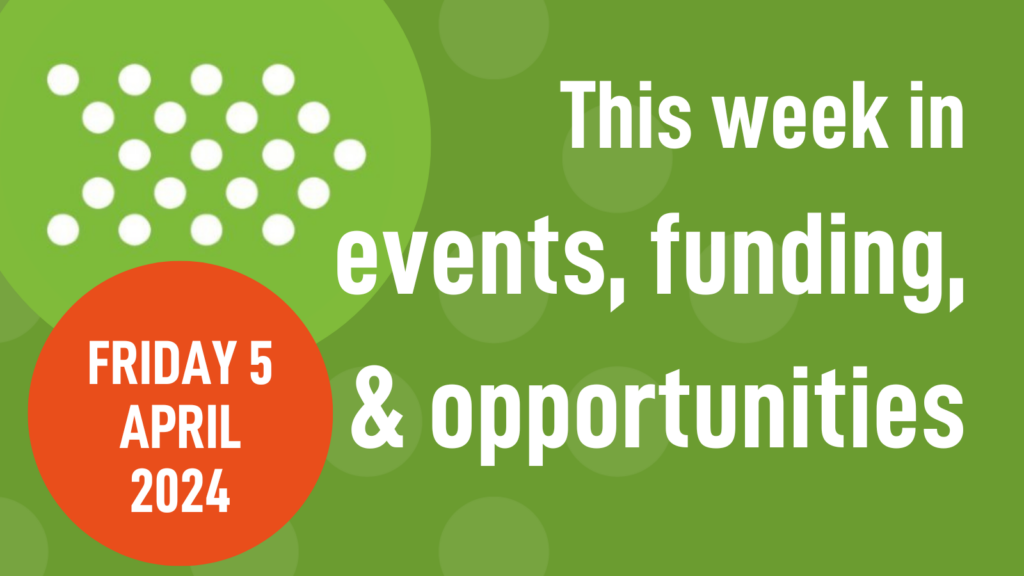
Weekly roundup 05/04/24: events, funding, & opportunities in mental health research
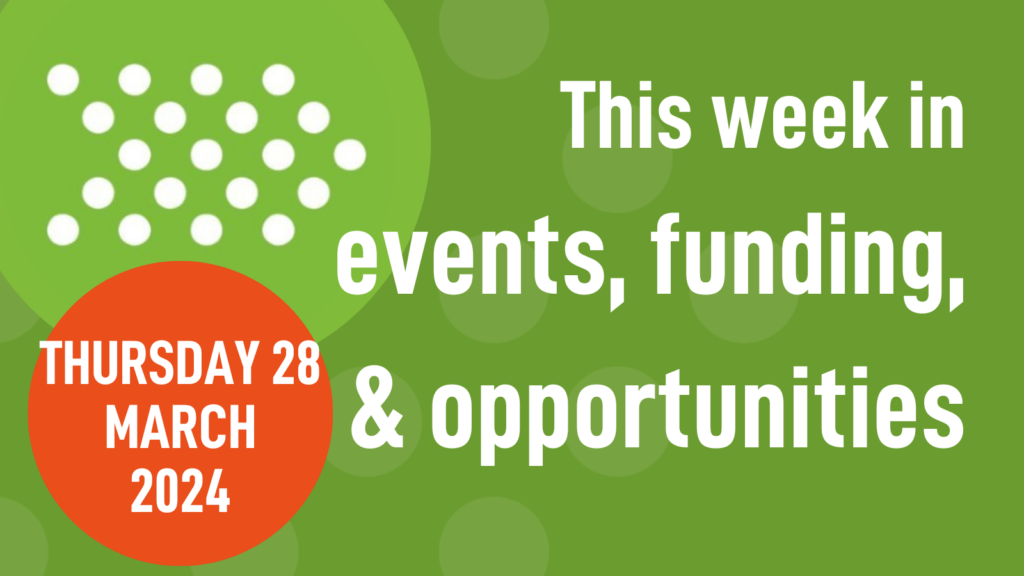
Weekly roundup 28/03/24: events, funding, & opportunities in mental health research


Wellcome Neuroscience and Mental Health
This is some advance warning about a grant programme due to launch in mid April which will be of particular interest to clinical professionals working in mental health who want to take a neuroscience based approach to their research. The scheme has a novel matchmaking approach and is focused on tackling anxiety, depression and/or psychosis…
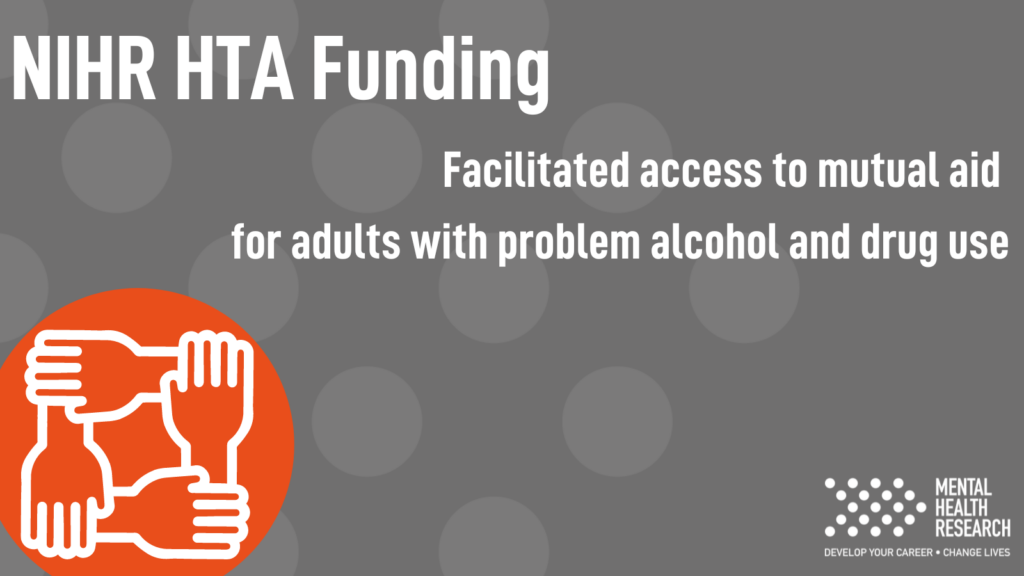
NIHR HTA funding for addiction support services
This one is for our new addiction research followers! The NIHR have announced a new funding scheme within the Health Technology Assessment programme titled: Facilitated access to mutual aid for adults with problem alcohol and drug use. This will be the first stage of a 2 stage application to commission a trial delivering a mutual aid…
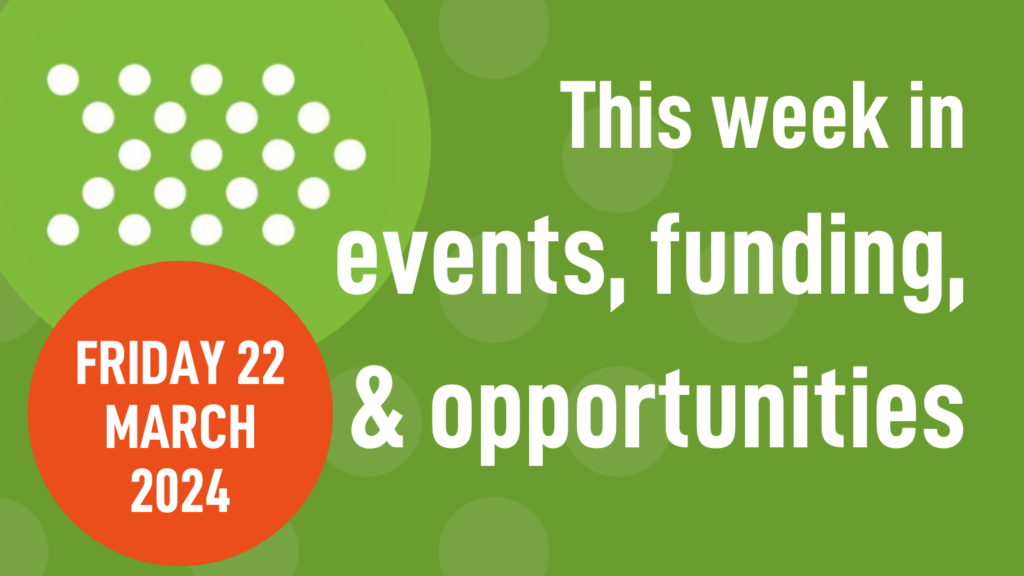
Weekly roundup 22/03/24: events, funding, & opportunities in mental health research

Wellcome Early-Career Awards
There are some funding schemes out there that can set up early career researchers and provide support for those tricky few years before research independence. The thrice yearly Wellcome Early-Career award is one of them, and therefore should be of significant interest to mental health and addiction ECRs. Even if it might seem a far…
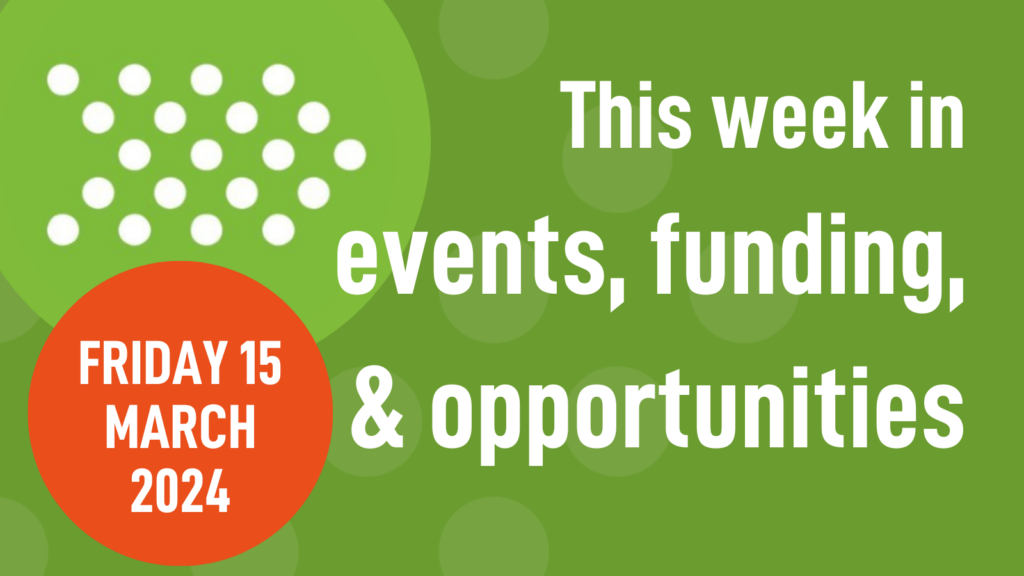
Weekly roundup 15/03/24: events, funding, & opportunities in mental health research
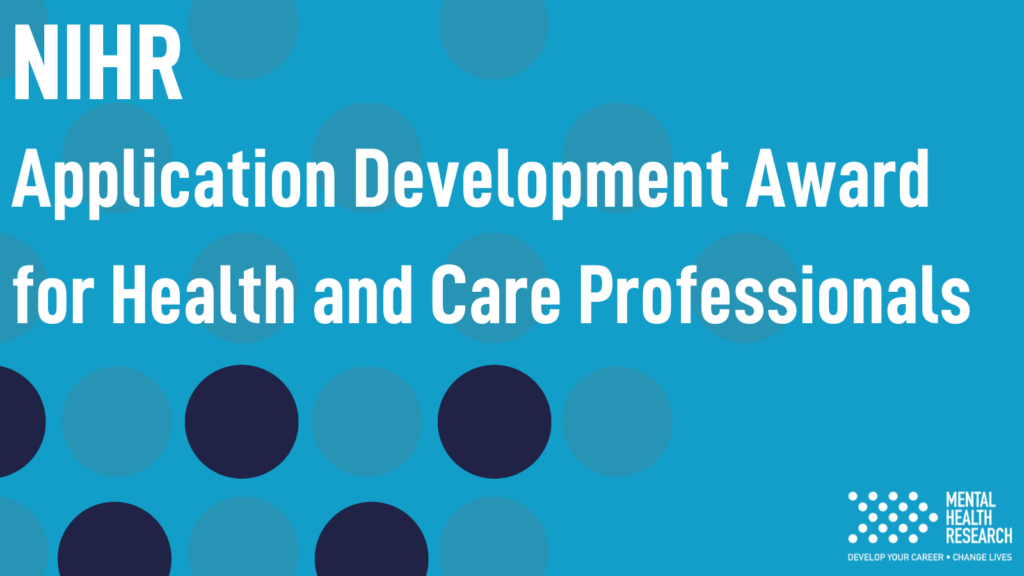
Application Development Award for Health and Care Professionals
Calling all registered health and care professionals! The NIHR recently launched a funding call specifically to help you prepare for a research grant application on any of NIHR’s funding streams. This is a great opportunity for anyone working on the front line of delivery who wants to develop a research component to your career by…
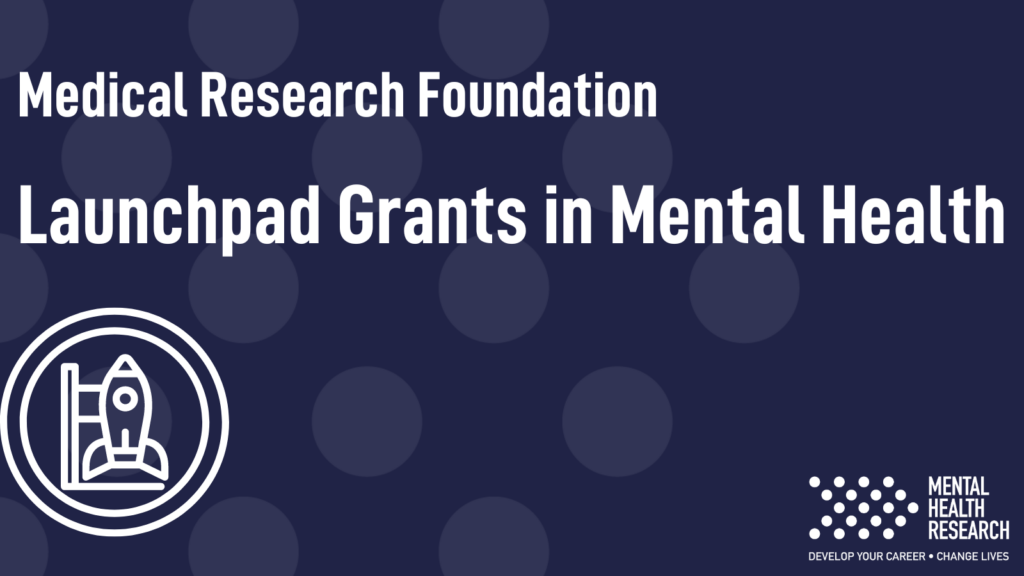
Launchpad Grants in Mental Health
This one is for all you mid career mental health researchers – apply for up to £100,000 to support research over a period of up to 2 years from the Medical Research Foundation’s Launchpad Grants. The applications can be from any area of mental health research, but the Medical Research Foundation is particularly encouraging applications…
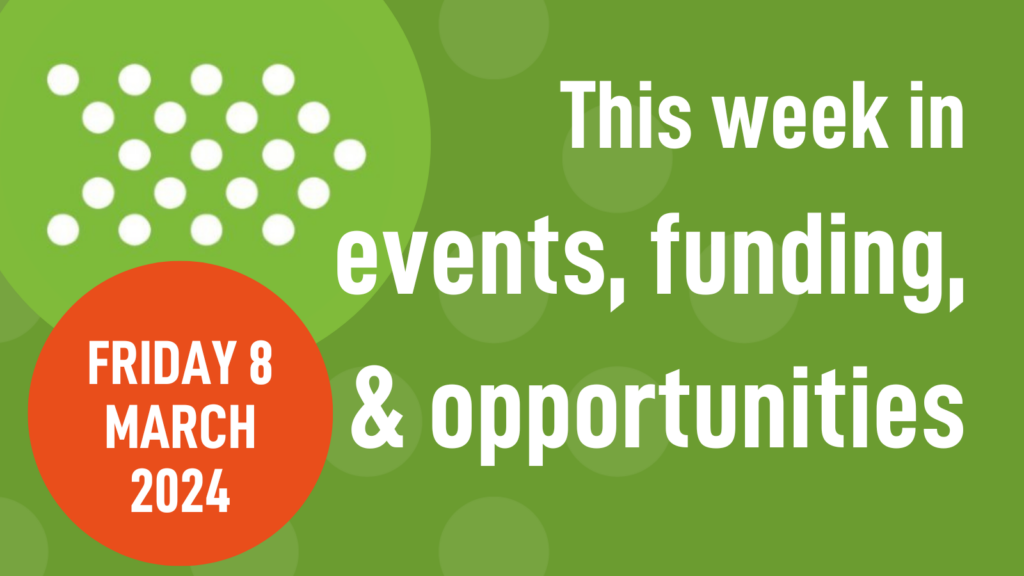
Weekly roundup 08/03/24: events, funding, & opportunities in mental health research
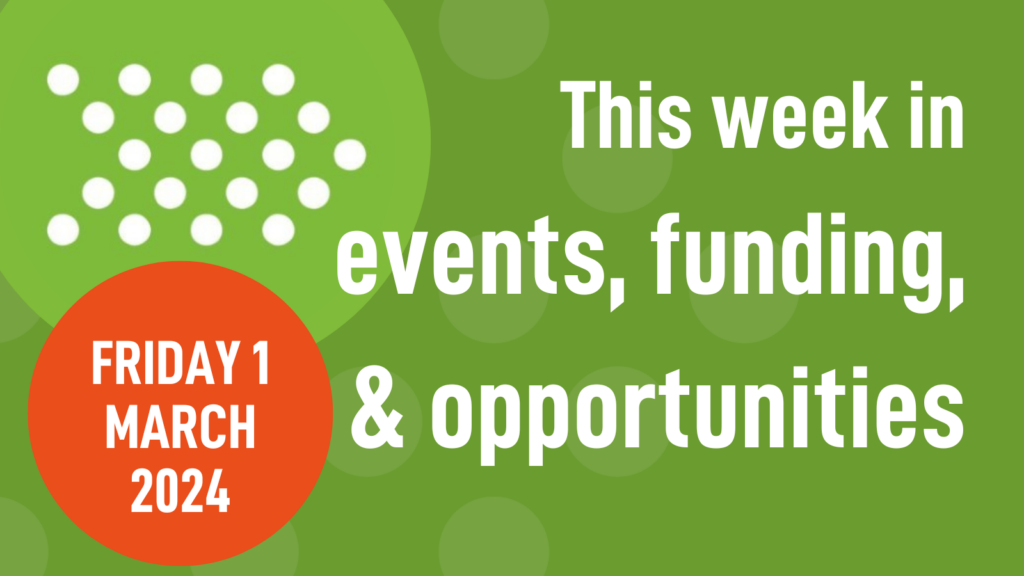
Weekly roundup 01/03/24: events, funding, & opportunities in mental health research
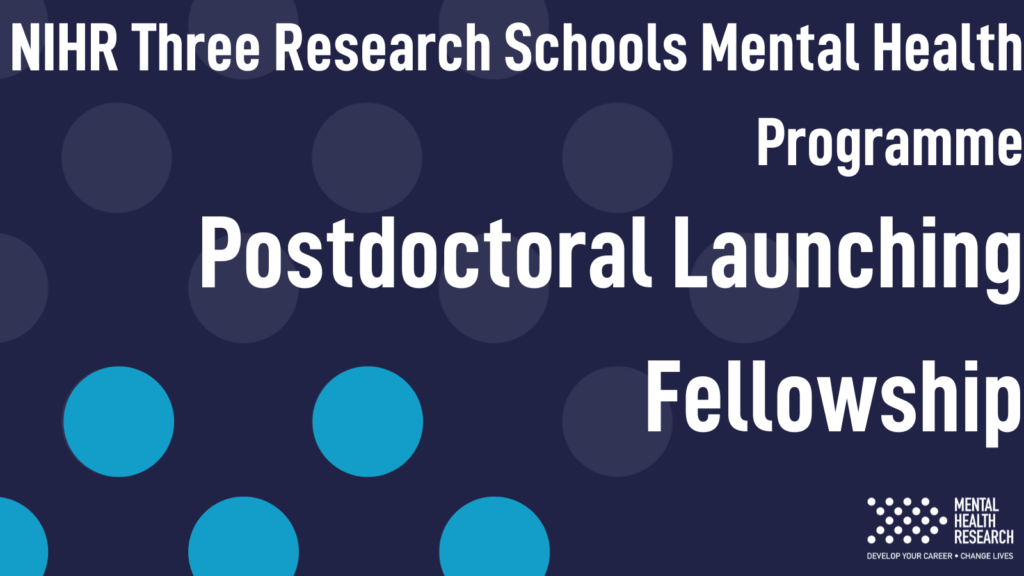
Three NIHR Research Schools’ Mental Health Programme – Postdoctoral launching research fellowship
With the addition of £4.98m in additional funding the NIHR Three Schools Mental Health Project has launched three new open funding calls, each focused on a separate career stage. This call is for early career researchers with a PhD who are seeking funding to support their career development towards research independence and establish a research…
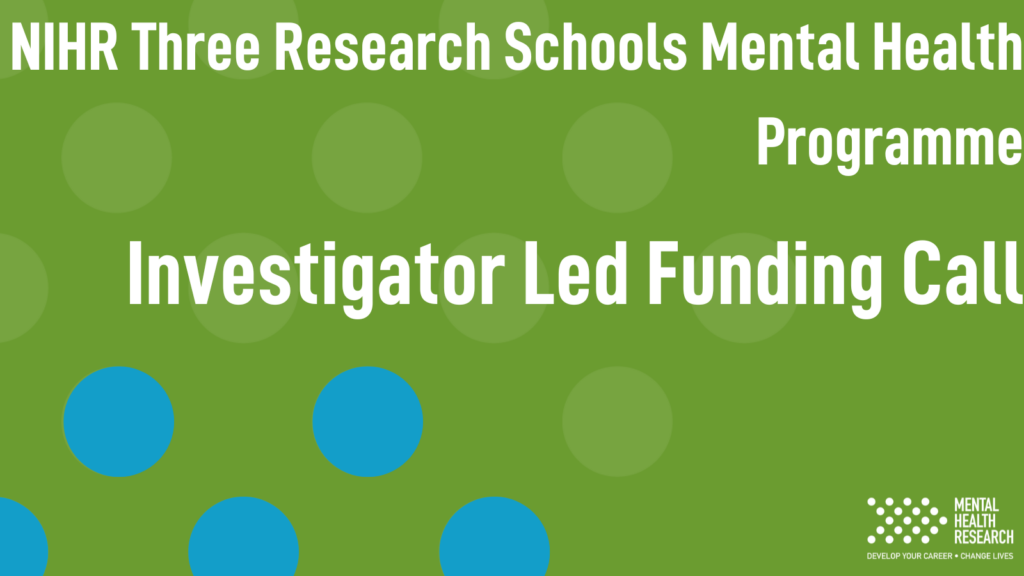
NIHR Three Research Schools’ Mental Health – Investigator led call
NIHR’s Three Schools Mental Health programme has just announced that it has launched its second phase of funding calls with an additional £4.98m available, so we thought we would do a little overview about each offering to help you understand more as they are really great opportunities. The first of the three open calls is…
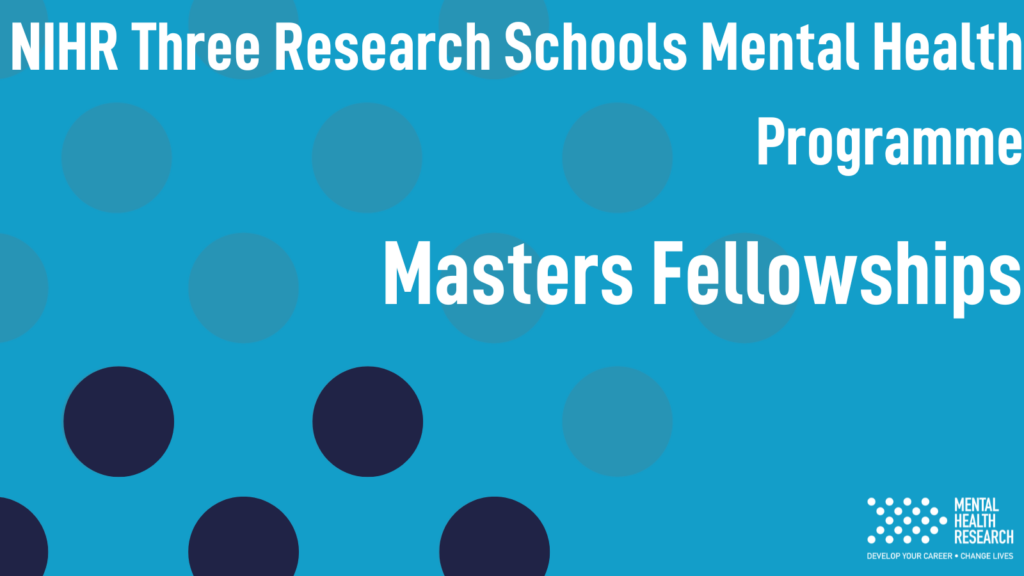
Three NIHR Research Schools’ Mental Health Programme- Masters Fellowships
The Three NIHR Research Schools have announced a further £4.98m of additional funding for phase two of their support programme for mental health research. This funding is available in the form of 3 structured open calls, at the moment, each aimed at people at different stages in their research career. This one is for 8…
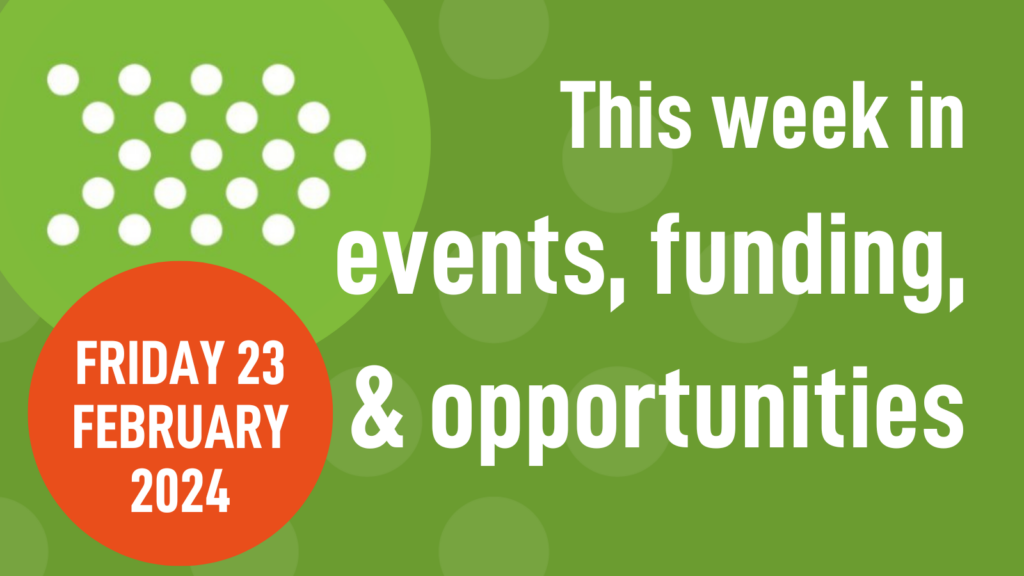
Weekly roundup 23/02/24: events, funding, & opportunities in mental health research
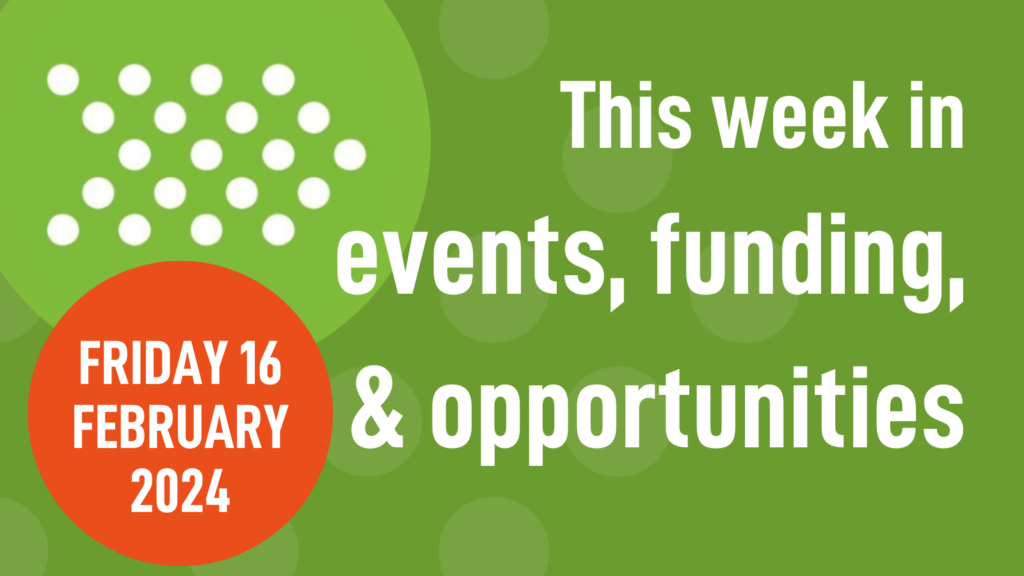
Weekly roundup 16/02/24: events, funding, & opportunities in mental health research

Mental Health Research UK – PhD Scholarship Competition 2025
This is a great opportunity for mental health researchers focusing on maternal mental health who are wanting to supervise a PhD student. Just for clarity: The application is for universities in the UK to apply for funding to host the scholarships, they are not open to potential PhD candidates to apply for. Mental Health Research…
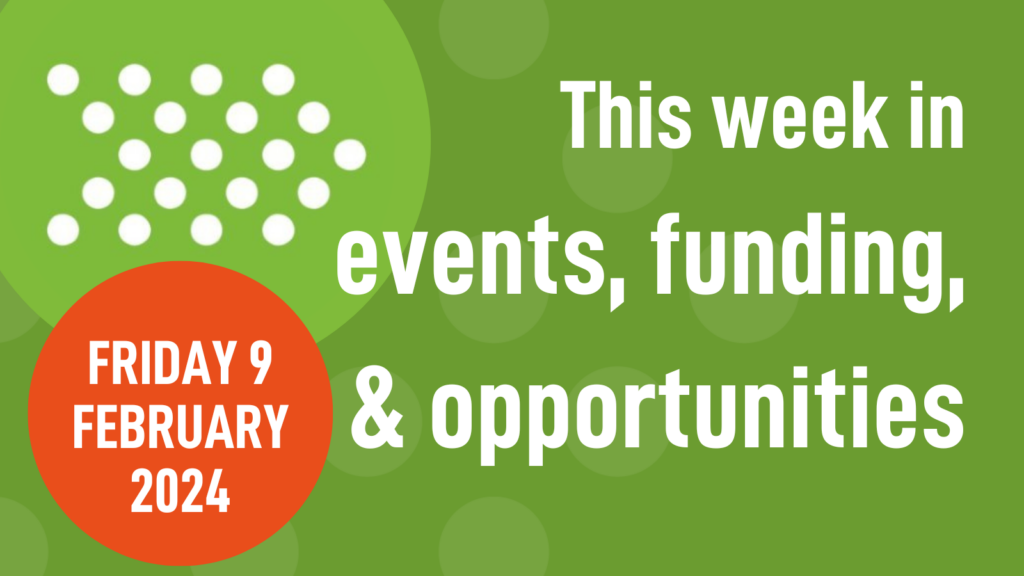
Weekly roundup 09/02/24: events, funding, & opportunities in mental health research
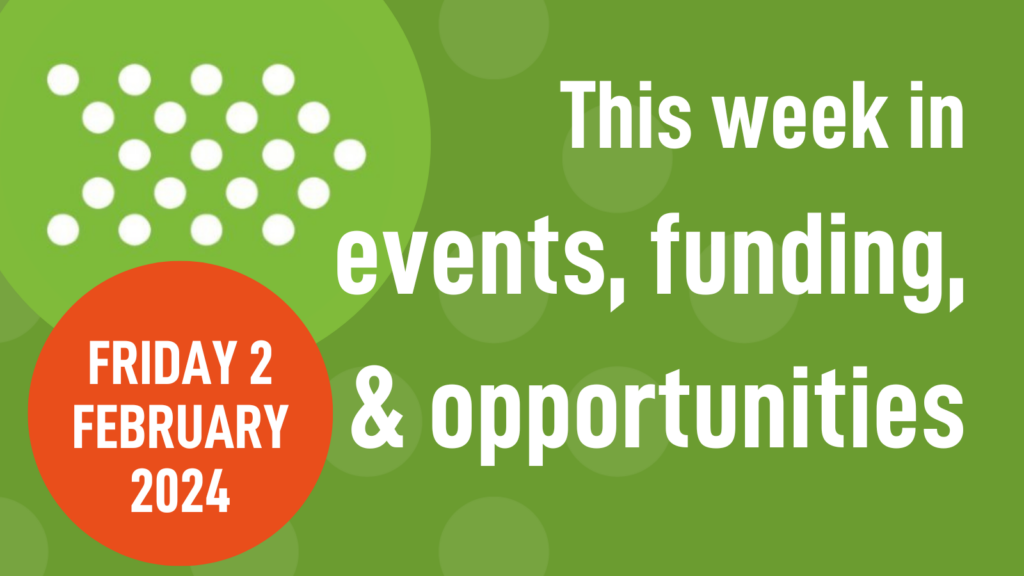
Weekly roundup 02/02/24: events, funding, & opportunities in mental health research
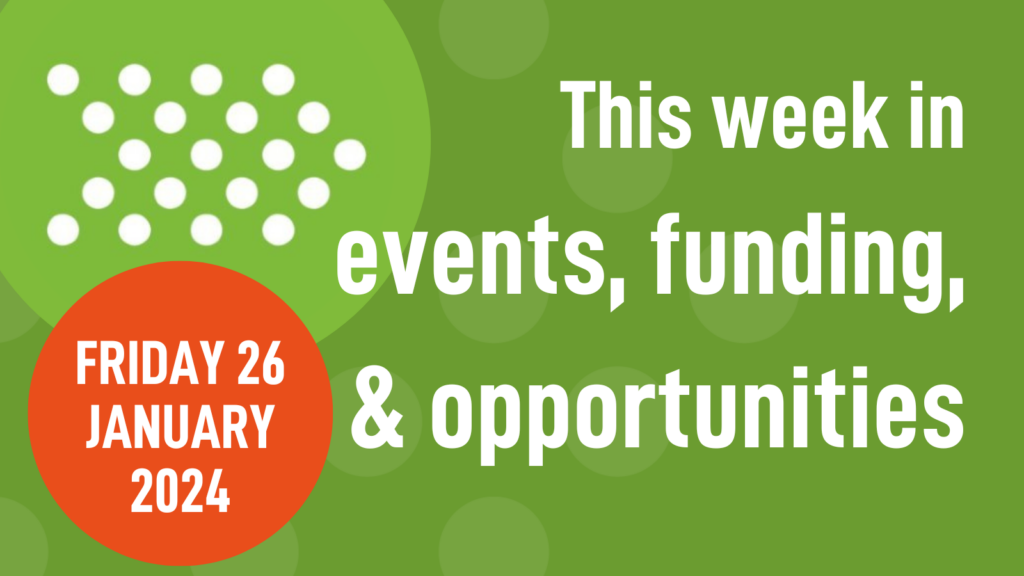
Weekly roundup 26/01/24: events, funding, & opportunities in mental health research
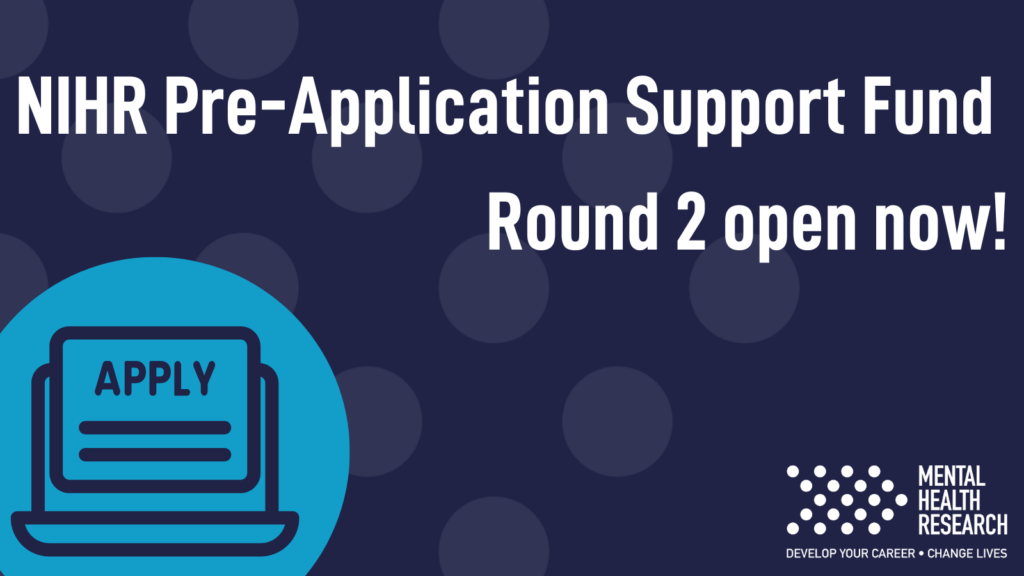
NIHR Pre-Application Support Fund Round 2
This is a key one for ECRs in mental health research – the NIHR Pre-Application Support Fund is back for round 2! Read on for more info on why it is so useful. What is it? The fund is aimed at providing short term, 12 month, support to enable researchers to carve out time or…
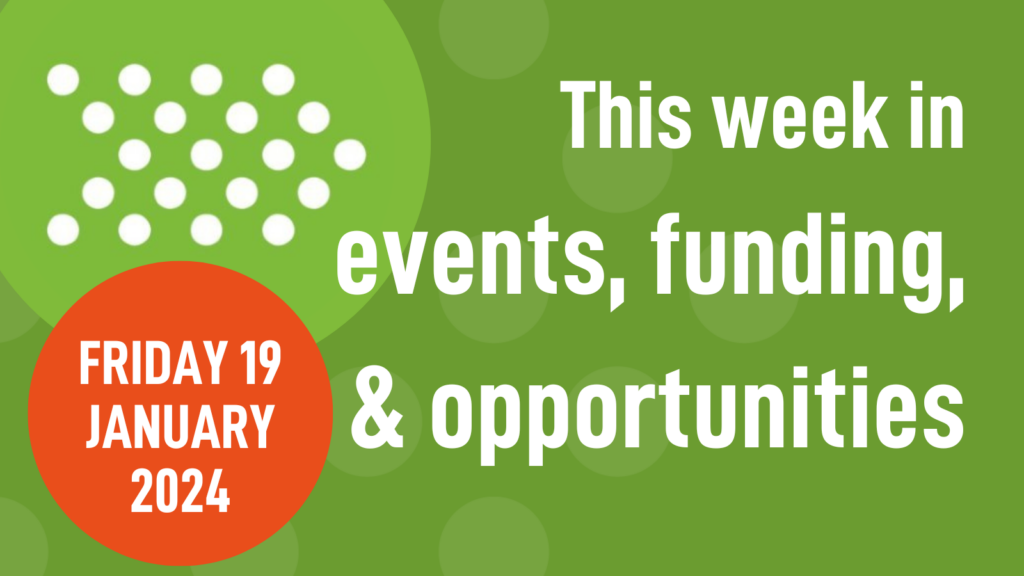
Weekly roundup 19/01/24: events, funding, & opportunities in mental health research
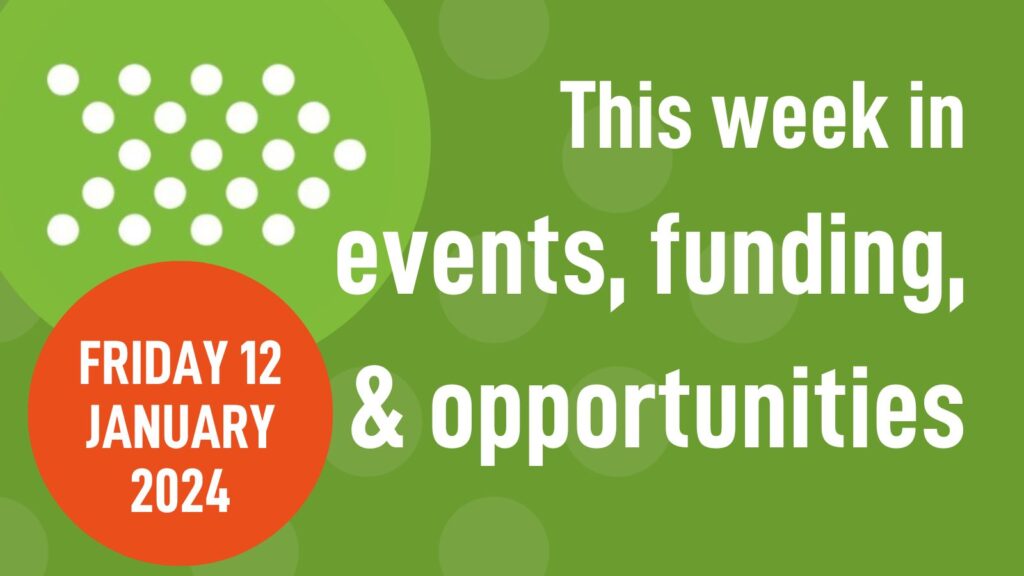
Weekly roundup 12/01/24: events, funding, & opportunities in mental health research
Weekly roundup 15/12/23: events, funding, & opportunities in mental health research
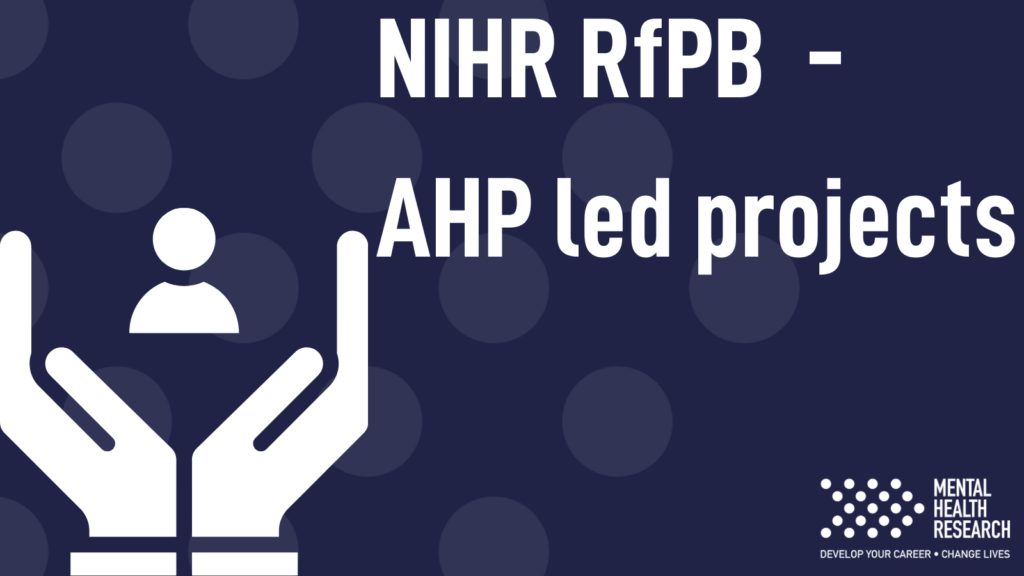
NIHR RfPB call for AHP led projects
Calling all ECR AHPs working in mental health research: the NIHR is launching its latest round of its research for patient benefit (RfPB) call this week on 13 December – this time focusing on projects which are led by allied health professionals! This is a perfect funding scheme to apply for for AHPs working in…

NIHR Doctoral Fellowship webinar
Are you wanting to take your mental health research career to the next level and thinking of applying to the NIHR Doctoral Fellowship? The current round is open until 1300hrs, 1 February 2024. However, it comes up twice a year in April and October so check out these resources and be ahead for the next…
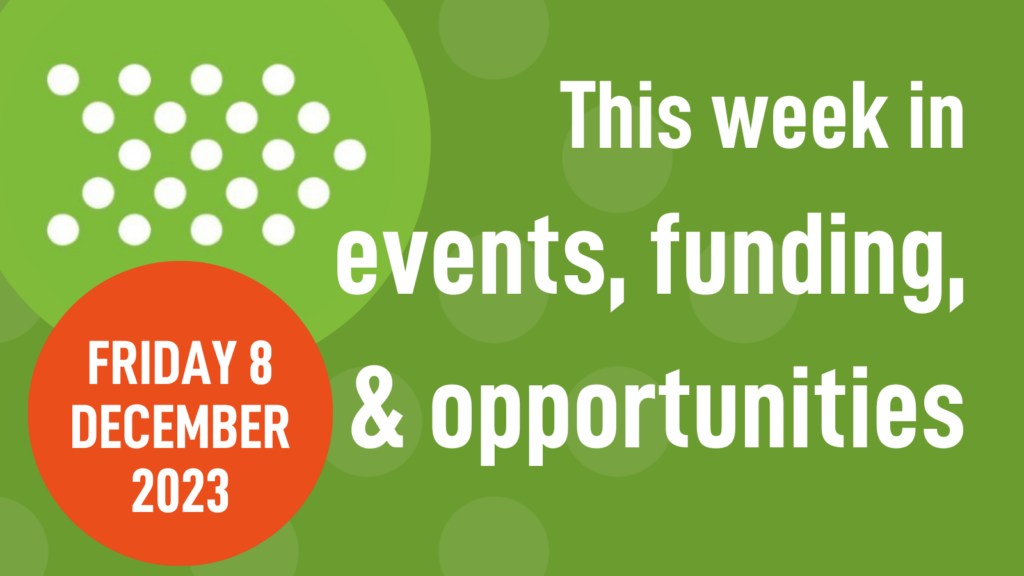
Weekly roundup 8/12/23: events, funding, & opportunities in mental health research
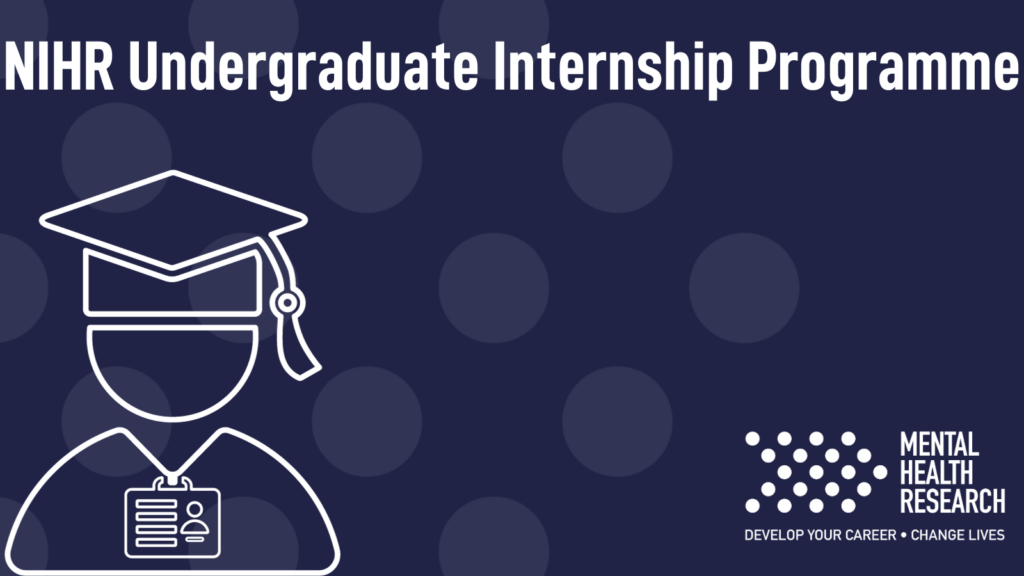
NIHR Undergraduate Internship Programme
The NIHR recently launched a new grant programme which is a great opportunity for early/mid career mental health researchers to support undergraduates to experience mental health research by having them as interns. Supervisor/applicant benefits This award is for early to mid career researchers who have yet to start establishing independence. In the first round the…
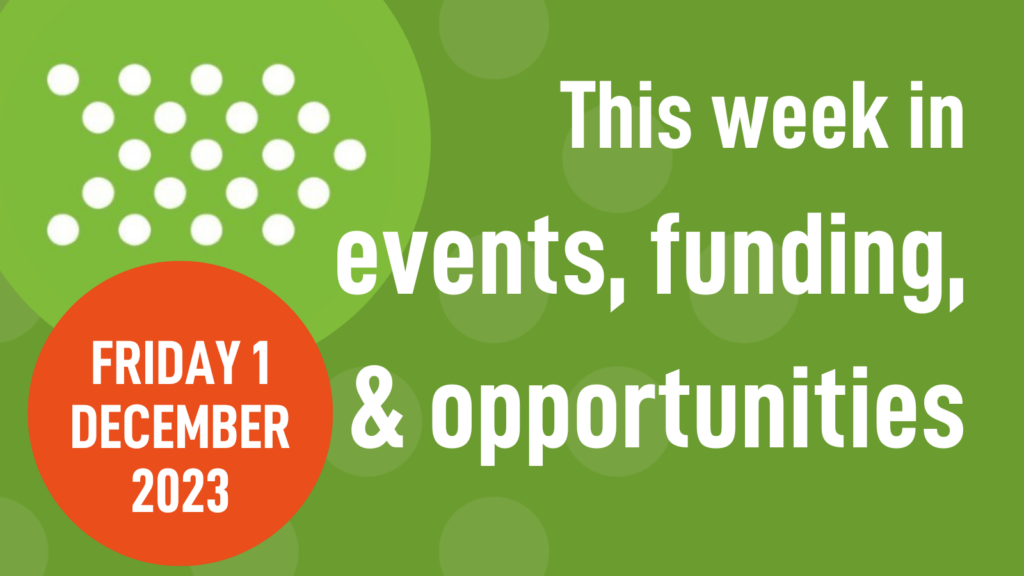
Weekly roundup 1/12/23: events, funding, & opportunities in mental health research

Weekly roundup 24/11/23: events, funding, & opportunities in mental health research
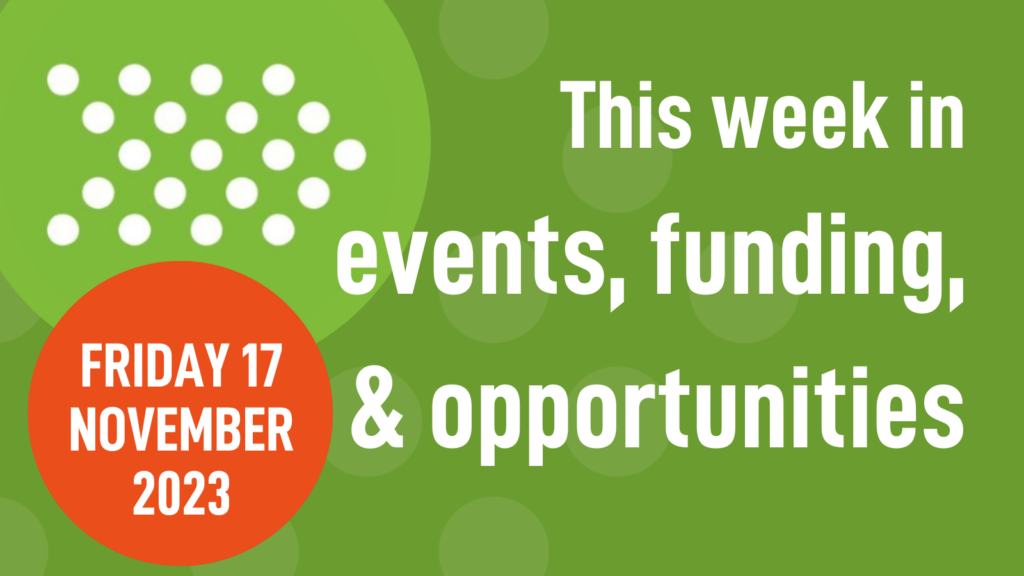
Weekly roundup 17/11/23: events, funding, & opportunities in mental health research
Nihr blog: common characteristics of a great fellowship application.
Leading public health researcher Professor Eileen Kaner chairs the NIHR Advanced Fellowship funding committee – so what better person is there to get the lowdown on the common characteristics of a great application. This is a must-read for any mental health researchers who are considering applying.
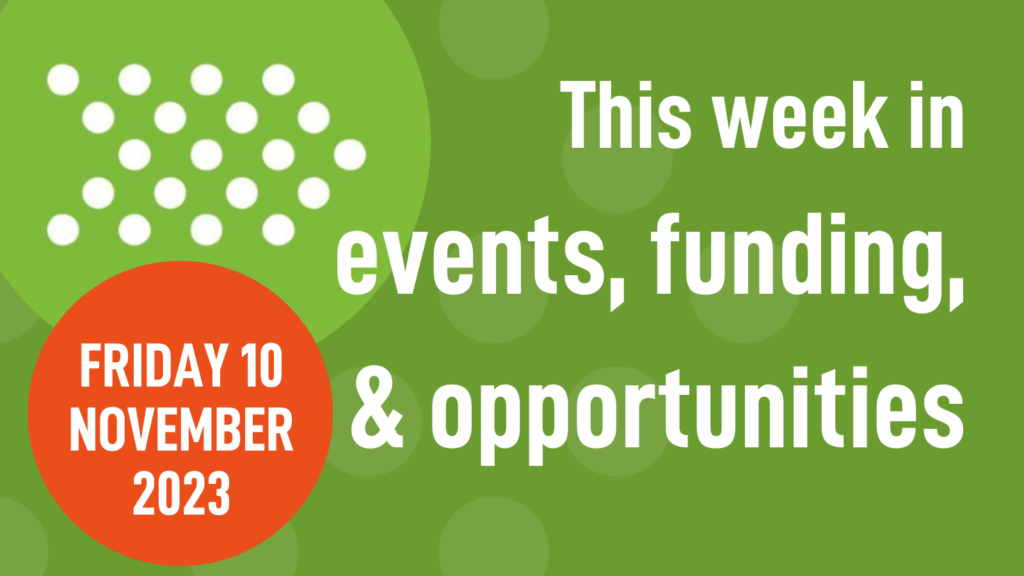
Weekly roundup 10/11/23: events, funding, & opportunities in mental health research
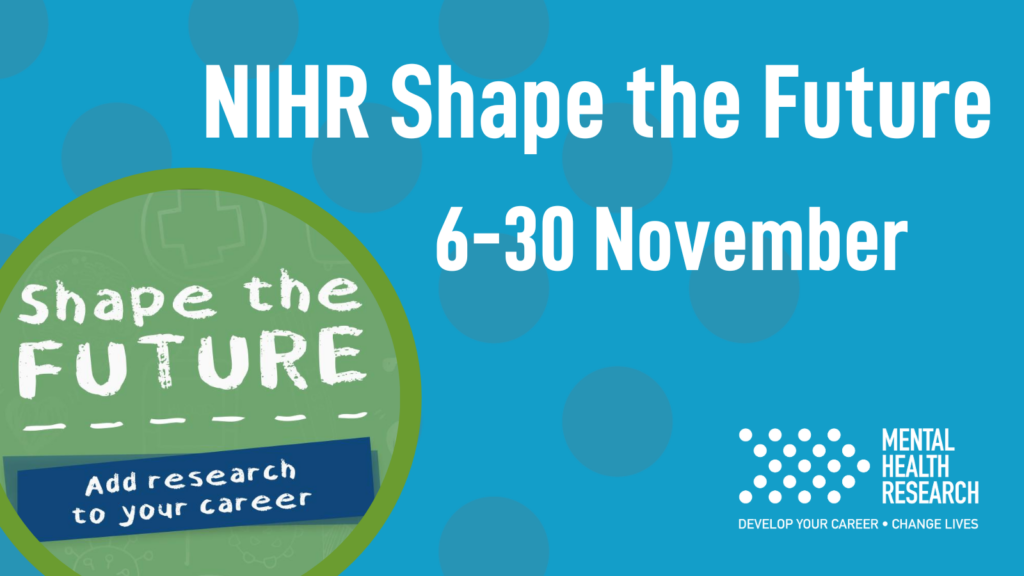
NIHR Shape the Future campaign
NIHR has launched a new campaign, working alongside the NHS, to encourage and support healthcare professionals and members of the NHS workforce to develop research as part of their career. These are not mental health research specific programmes, but are highly applicable to anyone in, interested in getting into, or wanting to support others to…
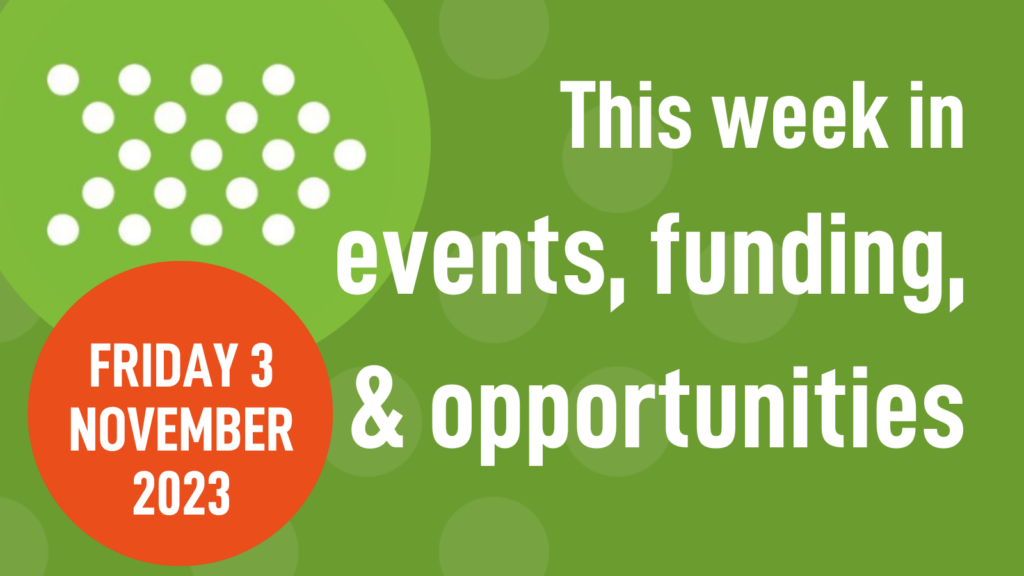
Weekly roundup 3/11/23: events, funding, & opportunities in mental health research
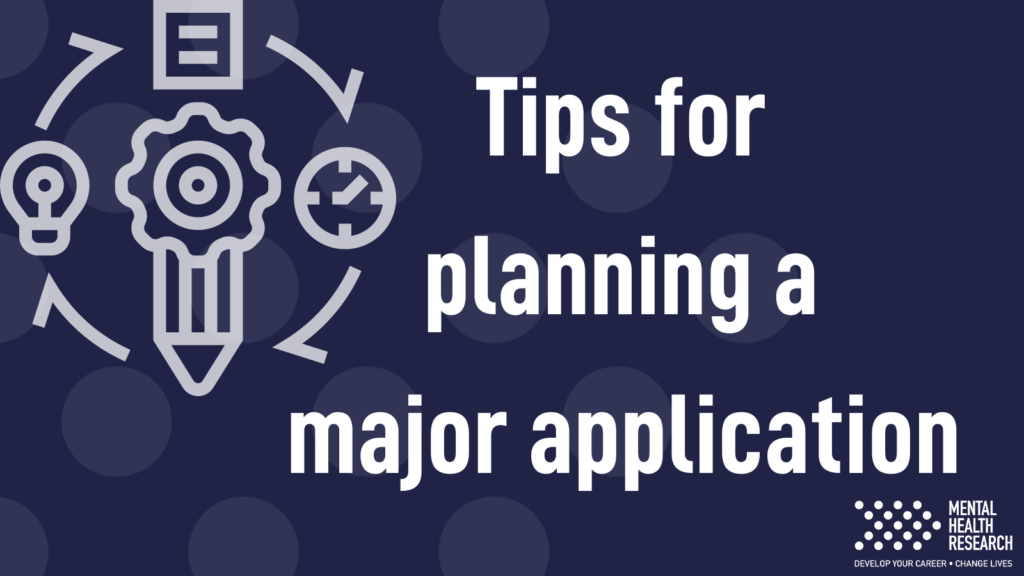
Tips for planning a major application
Getting a big grant or fellowship application together takes a very long time – often much longer than you might expect – certainly longer than the active application window. Many people have told us that it took them more than a year to get their application together. These funds are usually open to people from…

Mental health definitions contract opportunity at Wellcome – EOI by 13 Nov 2023
Contract opportunity for a mental health definitions project at Wellcome Trust
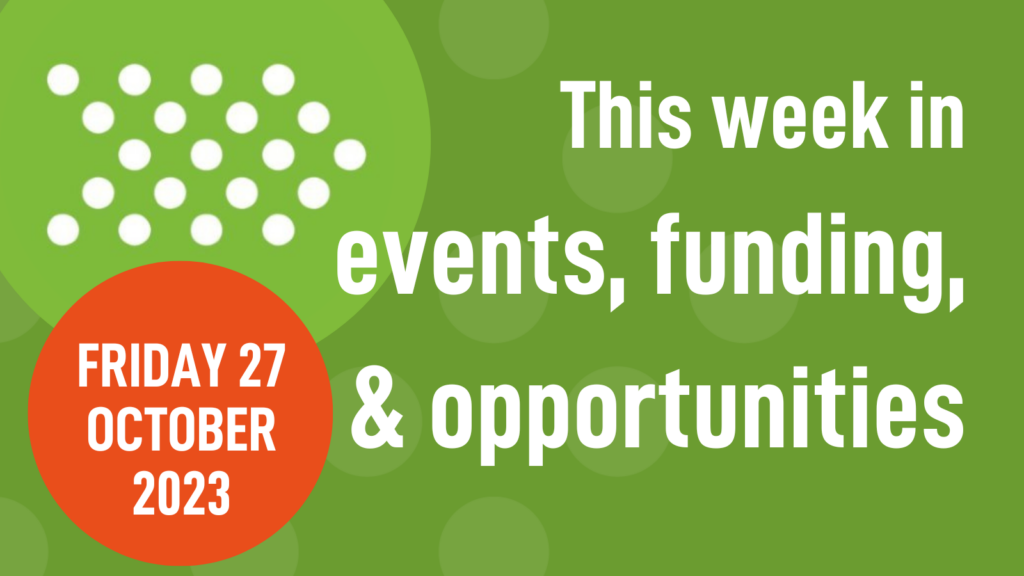
Weekly roundup 27/10/23: events, funding, & opportunities in mental health research
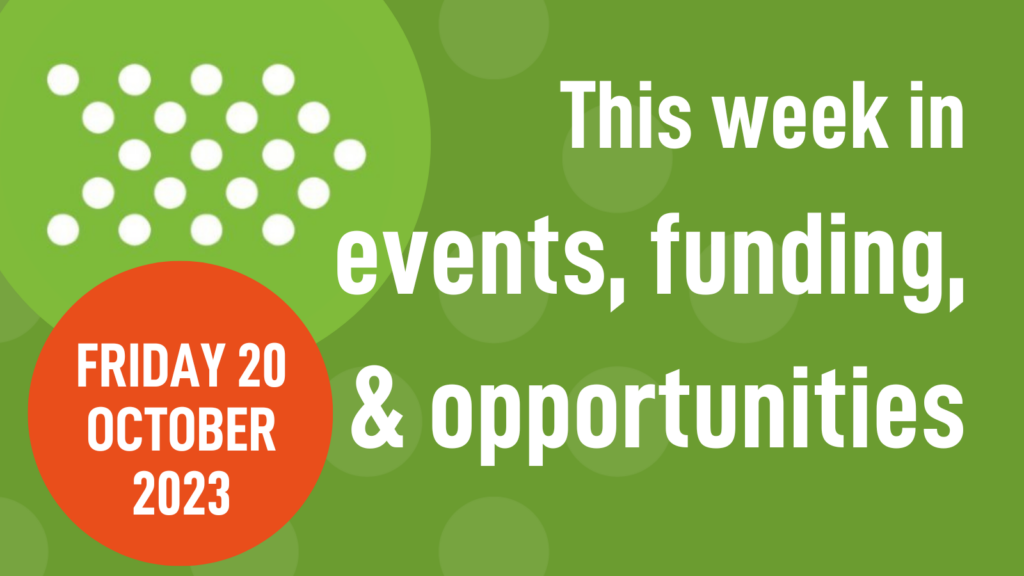
Weekly roundup 20/10/23: events, funding, & opportunities in mental health research
Welcome to your weekly roundup of funding, events, and webinars we’ve shared with our followers over on the Mental Health Research Incubator Twitter. Here’s what’s coming up on the horizon for mental health research.
Newsletter sign up
By clicking sign up I confirm that I have read and agree with the privacy policy

Widespread recessive effects on common diseases in a cohort of 44,000 British Pakistanis and Bangladeshis with high autozygosity
- Find this author on Google Scholar
- Find this author on PubMed
- Search for this author on this site
- ORCID record for Teng Hiang Heng
- For correspondence: [email protected] [email protected]
- ORCID record for Mark J Daly
- ORCID record for Henrike Heyne
- ORCID record for David A. van Heel
- Info/History
- Supplementary material
- Preview PDF
Genetic association studies have focused on testing additive models in cohorts with European ancestry. Little is known about recessive effects on common diseases, specifically for non-European ancestry. Genes & Health is a cohort of British Pakistani and Bangladeshi individuals with elevated rates of consanguinity and endogamy, making it suitable to study recessive effects. We imputed variants into 44,190 genotyped individuals, using two imputation panels: a set of 4,982 whole-exome-sequences from within the cohort, and the TOPMed-r2 panel. We performed association testing with 898 diseases from electronic health records. We identified 185 independent loci that reached standard genome-wide significance (p<5×10 −8 ) under the recessive model and had p-values more significant than under the additive model. 140 loci demonstrated nominally-significant (p<0.05) dominance deviation p-values, confirming a recessive association pattern. Sixteen loci in three clusters were significant at a Bonferroni threshold accounting for multiple phenotypes tested (p<5.5×10 −12 ). In FinnGen, we replicated 44% of the expected number of Bonferroni-significant loci we were powered to replicate, at least one from each cluster, including an intronic variant in PNPLA3 (rs66812091) and non-alcoholic fatty liver disease, a previously reported additive association. We present novel evidence suggesting that the association is recessive instead (OR=1.3, recessive p=2×10 −12 , additive p=2×10 −11 , dominance deviation p=3×10 −2 , FinnGen recessive OR=1.3 and p=6×10 −12 ). We identified a novel protective recessive association between a missense variant in SGLT4 (rs61746559), a sodium-glucose transporter with a possible role in the renin-angiotensin-aldosterone system, and hypertension (OR=0.2, p=3×10 −8 , dominance deviation p=7×10 −6 ). These results motivate interrogating recessive effects on common diseases more widely.
- Download figure
- Open in new tab
Competing Interest Statement
The authors have declared no competing interest.
Funding Statement
This research was funded in part by Wellcome (grant no. 220540/Z/20/A, Wellcome Sanger Institute Quinquennial Review 2021–2026). For the purpose of open access, the authors have applied a CC–BY public copyright licence to any author accepted manuscript version arising from this submission. Genes & Health is/has recently been core–funded by Wellcome (WT102627, WT210561), the Medical Research Council (UK) (M009017, MR/X009777/1, MR/X009920/1), Higher Education Funding Council for England Catalyst, Barts Charity (845/1796), Health Data Research UK (for London substantive site), and research delivery support from the NHS National Institute for Health Research Clinical Research Network (North Thames). Genes & Health is/has recently been funded by Alnylam Pharmaceuticals, Genomics PLC; and a Life Sciences Industry Consortium of Astra Zeneca PLC, Bristol–Myers Squibb Company, GlaxoSmithKline Research and Development Limited, Maze Therapeutics Inc, Merck Sharp & Dohme LLC, Novo Nordisk A/S, Pfizer Inc, Takeda Development Centre Americas Inc. T. H. Heng is supported by the Agency for Science, Technology, and Research (A∗STAR) National Science Scholarship. The FinnGen project is funded by two grants from Business Finland (HUS 4685/31/2016 and UH 4386/31/2016) and the following industry partners: AbbVie Inc., AstraZeneca UK Ltd, Biogen MA Inc., Bristol Myers Squibb (and Celgene Corporation & Celgene International II Sarl), Genentech Inc., Merck Sharp & Dohme LCC, Pfizer Inc., GlaxoSmithKline Intellectual Property Development Ltd., Sanofi US Services Inc., Maze Therapeutics Inc., Janssen Biotech Inc, Novartis Pharma AG, and Boehringer Ingelheim International GmbH.
Author Declarations
I confirm all relevant ethical guidelines have been followed, and any necessary IRB and/or ethics committee approvals have been obtained.
The details of the IRB/oversight body that provided approval or exemption for the research described are given below:
The London South East NRES Committee of the Health Research Authority gave ethical approval for the G&H work (14/LO/1240, dated 16 September 2014). The Coordinating Ethics Committee of the Hospital District of Helsinki and Uusimaa (HUS) gave ethical approval for the FinnGen work (Nr HUS/990/2017).
I confirm that all necessary patient/participant consent has been obtained and the appropriate institutional forms have been archived, and that any patient/participant/sample identifiers included were not known to anyone (e.g., hospital staff, patients or participants themselves) outside the research group so cannot be used to identify individuals.
I understand that all clinical trials and any other prospective interventional studies must be registered with an ICMJE-approved registry, such as ClinicalTrials.gov. I confirm that any such study reported in the manuscript has been registered and the trial registration ID is provided (note: if posting a prospective study registered retrospectively, please provide a statement in the trial ID field explaining why the study was not registered in advance).
I have followed all appropriate research reporting guidelines, such as any relevant EQUATOR Network research reporting checklist(s) and other pertinent material, if applicable.
Data and code availability
G&H data is available for analysis in a secure Trusted Research Environment. Application can be made to the G&H executive: https://www.genesandhealth.org/research/scientists-using-genes-health-scientific-research
Information on how to access FinnGen data can be found here: https://www.finngen.fi/en/access_results
Software used in the data analysis are publicly available and have been cited. Code written to run these algorithms is available upon reasonable request to the authors.
View the discussion thread.
Supplementary Material
Thank you for your interest in spreading the word about medRxiv.
NOTE: Your email address is requested solely to identify you as the sender of this article.

Citation Manager Formats
- EndNote (tagged)
- EndNote 8 (xml)
- RefWorks Tagged
- Ref Manager
- Tweet Widget
- Facebook Like
- Google Plus One
Subject Area
- Genetic and Genomic Medicine
- Addiction Medicine (316)
- Allergy and Immunology (621)
- Anesthesia (162)
- Cardiovascular Medicine (2294)
- Dentistry and Oral Medicine (280)
- Dermatology (202)
- Emergency Medicine (370)
- Endocrinology (including Diabetes Mellitus and Metabolic Disease) (814)
- Epidemiology (11610)
- Forensic Medicine (10)
- Gastroenterology (682)
- Genetic and Genomic Medicine (3609)
- Geriatric Medicine (338)
- Health Economics (620)
- Health Informatics (2323)
- Health Policy (916)
- Health Systems and Quality Improvement (868)
- Hematology (336)
- HIV/AIDS (757)
- Infectious Diseases (except HIV/AIDS) (13189)
- Intensive Care and Critical Care Medicine (760)
- Medical Education (360)
- Medical Ethics (101)
- Nephrology (392)
- Neurology (3387)
- Nursing (192)
- Nutrition (511)
- Obstetrics and Gynecology (652)
- Occupational and Environmental Health (652)
- Oncology (1774)
- Ophthalmology (526)
- Orthopedics (210)
- Otolaryngology (284)
- Pain Medicine (226)
- Palliative Medicine (66)
- Pathology (441)
- Pediatrics (1010)
- Pharmacology and Therapeutics (423)
- Primary Care Research (409)
- Psychiatry and Clinical Psychology (3097)
- Public and Global Health (6014)
- Radiology and Imaging (1234)
- Rehabilitation Medicine and Physical Therapy (717)
- Respiratory Medicine (813)
- Rheumatology (370)
- Sexual and Reproductive Health (358)
- Sports Medicine (318)
- Surgery (390)
- Toxicology (50)
- Transplantation (171)
- Urology (142)
UK Sanctions Businesses Funding Sudanese Conflict

British Foreign Secretary David Cameron attends the 54th annual meeting of the World Economic Forum, in Davos, Switzerland, January 17, 2024. REUTERS/Denis Balibouse/File Photo
LONDON (Reuters) - Britain on Monday imposed sanctions against three businesses which it said were funding military groups behind the conflict in Sudan and reiterated its calls for a lasting ceasefire.
The measures mark the first anniversary of the war between rival military factions in the east African nation, which has pushed parts of the country to the brink of famine and left millions of people in need of assistance.
"A year on since the outbreak of fighting, we continue to see appalling atrocities against civilians, unacceptable restrictions on humanitarian access and an utter disregard for civilian life," British Foreign Secretary David Cameron said.
"The businesses that support the warring parties must be held to account, alongside those responsible for human rights abuses. The world must not forget about Sudan. We urgently need to end the violence."
Britain said Alkhaleej Bank, Al-Fakher Advanced Works and Red Rock Mining would be subject to an asset freeze, limiting their financial freedom.
Last month Britain pledged an 89 million pound ($111 million) aid package for Sudan.
Photos You Should See - April 2024

($1 = 0.8008 pounds)
(Reporting by Sachin Ravikumar; editing by William James and Paul Sandle)
Copyright 2024 Thomson Reuters .
Join the Conversation
Tags: Africa , international trade , United Kingdom , Europe , mining , Sudan
America 2024

Health News Bulletin
Stay informed on the latest news on health and COVID-19 from the editors at U.S. News & World Report.
Sign in to manage your newsletters »
Sign up to receive the latest updates from U.S News & World Report and our trusted partners and sponsors. By clicking submit, you are agreeing to our Terms and Conditions & Privacy Policy .
You May Also Like
The 10 worst presidents.
U.S. News Staff Feb. 23, 2024

Cartoons on President Donald Trump
Feb. 1, 2017, at 1:24 p.m.

Photos: Obama Behind the Scenes
April 8, 2022

Photos: Who Supports Joe Biden?
March 11, 2020

The FBI and NTSB Bridge Collapse Probes
Laura Mannweiler April 15, 2024

How Congress Plans to Respond to Iran
Aneeta Mathur-Ashton April 15, 2024

Trump Historic Hush Money Trial Begins
Lauren Camera April 15, 2024

War Hangs Over Economy, Markets
Tim Smart April 15, 2024

Trump Gives Johnson Vote of Confidence
Aneeta Mathur-Ashton April 12, 2024

U.S.: Threat From Iran ‘Very Credible’
Cecelia Smith-Schoenwalder April 12, 2024


MRC fund to improve public involvement in discovery science

9 April 2024
Researchers can seek support for projects up to £625,000 to improve the design and practice of public involvement in non-clinical health and biomedical research.
Non-clinical research is an area that has traditionally been seen as harder to involve the public, patients, carers and communities.
The fund aims to support the development of toolkits that can be widely used to enrich public involvement in research.
It will support the mission of the Medical Research Council (MRC)-National Institute for Health and Care Research’s Better Methods, Better Research (BMBR) programme .
The programme’s mission is to ensure that optimal research methods are being used to advance biomedical, health and care-focused research, policy and delivery.
Results will help other researchers and funders
We are asking researchers to embrace the power of collaboration by including public contributors and professionals in their teams, and tackle gaps in public involvement by building on existing good practice.
The results produced will be aimed at other researchers, funders and public contributors to improve public involvement.
Research themes could include public involvement in fundamental research, such as:
- cell biology or biochemistry
- data science research such as statistical modelling or machine learning
- methodological research such as epidemiology, health economics and clinical trials methodology
Co-creation from the outset
This funding opportunity is one of the first from MRC to involve public contributors right from the outset.
Public contributors sit on the advisory group that developed the opportunity and will work side by side with the BMBR Panel throughout the decision-making process for allocating funding.
Ruby Bhatti OBE DL, advisory group member, said:
Getting involved in research as a public contributor brings amazing results which truly have an impact on future treatment’s for patients like me. We work with researchers who value our input and passion and work alongside with us at every stage of the project. The voice and lived experience we bring from all walks of life helps researchers to understand what works well and what needs improving. The research then benefits us, our children and further generations to come.
Report backs deeper involvement in non-clinical research
A recent MRC landscape review found there was enthusiasm and appetite for public involvement across all areas of research, including non-clinical research.
Researchers, public participants and funders see public involvement as important for improving research quality, relevance, transparency and trust.
The report said non-clinical research should not be seen as a ‘special area’ and now was the time for MRC to foster greater inclusivity through supporting public involvement.
Dr Rosalind Roberts, MRC Programme Manager for BMBR, said:
Co-developing the opportunity with the advisory group will drive up the quality of applications we receive, as they challenged us to make sure proposals include meaningful public involvement and that redundant tools are not created. I am grateful for their guidance and patience and am looking forward to the applications we will receive – and that they will be involved in assessing.
Further information
The funding opportunity opens on 10 April 2024 and closes at 4pm 12 June 2024.
Find out more and apply on the funding finder when the opportunity opens.
A briefing webinar was held on 21 February.
Watch the briefing webinar on Zoom.
Passcode: rq!#9G7a
Top image: Credit: SolStock, E+ via Getty Images
Share this page
- Share this page on Twitter
- Share this page on LinkedIn
- Share this page on Facebook
This is the website for UKRI: our seven research councils, Research England and Innovate UK. Let us know if you have feedback or would like to help improve our online products and services .

IMAGES
COMMENTS
UK health research funding has increased since 2004, reaching £5 billion in 2022 with growth in translational and infection research, but is now plateauing. A report published today, the UK Health Research Analysis 2022, provides the most detailed overview yet of UK health research funding from 2004 to 2022 from all public sectors, including: ...
Global Health Research Development Awards - Call 1. Closes: 13:00 on 15 May 2024 ... This award will fund UK early to mid-career researchers to spend between 6 and 12 months at the National Cancer Institute (NCI) Intramural Institutes in the USA. Closes: 02 August 2024; NIHR Development and Skills Enhancement Award (DSE) The DSE award is a post ...
We fund, enable and deliver world-leading health and social care research that improves people's health and wellbeing, and promotes economic growth. ... In the biggest cystic fibrosis trial in the UK, NIHR-funded research has shown that a personalised web platform, CFHealthHub, could markedly increase adherence to treatment. ... NIHR is a major ...
Association of Medical Research Charities (AMRC) is the national membership organisation for medical and health research charities. AMRC members support over one-third of all UK publicly-funded medical research in the UK, with members investing over £1.2 billion in health research in the UK in 2012. Chief Scientist Office (CSO) offers a number ...
Latest funding opportunities for Public Health Research Public Health Intervention Responsive Studies Teams (PHIRST) 2024 24/27 Interventions to deliver inclusive economies 24/28 Parenting Interventions 24/29 The health of children and young people in contact with the criminal justice system 24/30 Developer contributions
Improvement programmes. Research programmes. Data analytics programmes. Promoting healthy lives programmes. We provide support and funding to those delivering health and social care in the UK to help shine a light on how to make successful change happen. We support testing and spreading of ideas, build capacity, skills and knowledge and share ...
Website. www .nihr .ac .uk. The National Institute for Health and Care Research ( NIHR) is the British government's major funder of clinical, public health, social care and translational research. [3] With a budget of over £1.2 billion in 2020-21, [4] its mission is to "improve the health and wealth of the nation through research". [5]
The funding totals £135 million and could transform the lives of millions of people living with a range of conditions, including dementia, mental ill health and obesity. The extra funding follows ...
This guidance builds on the original health service guidance (97)32, 'Responsibilities for Meeting Patient Care Costs associated with Research and Development in the NHS' but replaces the ...
Funding programmes. We provide support and funding to those delivering health and social care in the UK to help shine a... We fund research and policy analysis work to shine a light on how to make successful change happen - and have funded more than 150 external research projects across a range of themes over the last five years.
Today (Friday 14 October) the government has announced that over £800 million of funding, to be allocated by the National Institute for Health and Care Research ( NIHR ), will go to support ...
The UKCRC partnership supports coordination and collaboration between the major stakeholders that influence clinical research in the UK, and these efforts are underpinned by an analysis of UK health research funding every four to five years. This latest report is the fourth in a series that charts changes in health research over the last 14 ...
The Health Research Classification System was applied to over 23,500 projects supported by 173 funding organisations, corresponding to just over £5 billion of spend within the UK in 2022. The analysis showed that of the £5 billion spent: £2.8 billion was invested directly on research projects; £1.4 billion was spent on infrastructure and ...
Cancer Funding Medical Sciences. Cancer Research UK (CRUK) has awarded £9m to the University of Oxford, to support the next generation of doctors and scientists to bring novel cancer treatments to patients. CRUK is to award the funding over the next five years to train early-career clinician scientists - doctors who also carry out medical ...
The Department of Health and Social Care funds health and care research in England through the NIHR. It also supports applied health research for the direct and primary benefit of people in low- and middle-income countries, using UK government international development funding. Health and Care Research Wales is a national, multi-faceted ...
A research proposal is the start and the foundation for many studies, "whether it is to conduct an academic research project or to apply for funding and support for a specific study [].The authors will use their experiences and insights to guide new international researchers who are considering their first research grant application in the UK.
In addition to the research funding, staff working across the health and social care sector will be better equipped to tackle health inequalities from today, following the publication of a new e ...
Most funding (around 86% in 2023/24) goes to NHS England to pay for the day-to-day running costs of the NHS, including for staff pay and medicines. Planned NHS England RDEL in cash terms is £163bn in 2023/24 (£165bn in real terms), up £2.1bn from planned funding in the Autumn Statement. The planned budget for 2024/25 is £164.9bn.
The Three NIHR Research Schools have announced a further £4.98m of additional funding for phase two of their support programme for mental health research. This funding is available in the form of 3 structured open calls, at the moment, each aimed at people at different stages in their research career. This one is for 8….
The table below represents all mental health research grants funded in the UK between 2014 and 2017. Table 1. Total UK funding for mental health research by year (nominal amounts) What is mental health research? Increases in mental health research funding between 2008 and 2014 have been minimal - whilst the overall grants budget
Genes & Health is/has recently been core-funded by Wellcome (WT102627, WT210561), the Medical Research Council (UK) (M009017, MR/X009777/1, MR/X009920/1), Higher Education Funding Council for England Catalyst, Barts Charity (845/1796), Health Data Research UK (for London substantive site), and research delivery support from the NHS National ...
The HSE has said a new clinical programme for gender healthcare is being developed over the next two years, and that a major report published in the UK today will be reviewed as part of this.
US News is a recognized leader in college, grad school, hospital, mutual fund, and car rankings. Track elected officials, research health conditions, and find news you can use in politics ...
MRC fund to improve public involvement in discovery science. 9 April 2024. Researchers can seek support for projects up to £625,000 to improve the design and practice of public involvement in non-clinical health and biomedical research. Non-clinical research is an area that has traditionally been seen as harder to involve the public, patients ...